
FORM has just announced their newest smart goggles, the FORM Smart Swim 2. These heads-up display swim goggles automatically track all your swim stats as you swim while concurrently putting a screen inside the lens of the goggles for you to see everything from pacing information to structured workout details in real time. As the name implies, this is FORM’s second iteration of the goggles, following their first set that was launched back in 2019. The standout feature of the V2 goggles is an integrated heart rate sensor, which will automatically track your heart rate during your swims.
Further, they’re launching new software across both V1 & V2 goggles that adds a new openwater feature – SwimStraight – which as the name also implies, keeps you swimming straight if you’ve got reduced sighting conditions (or just aren’t good at swimming straight). Additionally, back on the V2 goggle hardware, there’s some improvements around fit and goggle strap design.
Both my wife and I have been putting various sets of these through their paces over the last while, both on nice cozy indoor pools, as well as @#$@# cold outdoor winter openwater swims. For real, 46°F/8°C water is not fun.
As always, this review isn’t sponsored. Once I’m done here I’ll get this pile of goggles back to them, and likely go out and get myself a V2 pair. If you found this review useful, you can use the links at the bottom, or consider becoming a DCR Supporter, which makes the site ad-free, while also getting access to a mostly weekly video series behind the scenes of the DCR Cave. And of course, it makes you awesome.
What’s New:
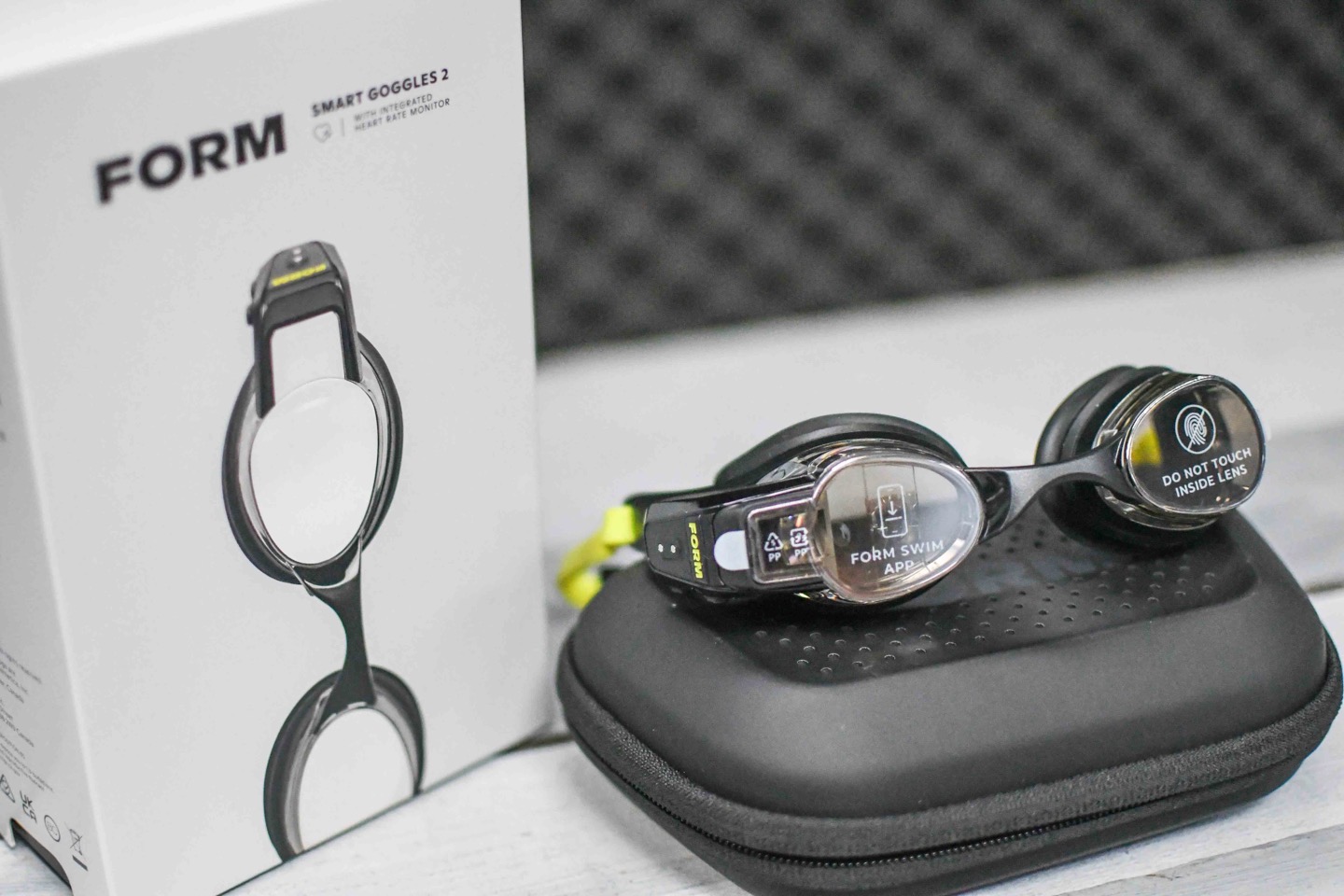
The updates to the swim goggle are essentially two-parts. The first part is software-related updates, that have largely already been made available to Smart Swim 1 users via firmware updates last fall, notably the HeadCoach pieces. However, new features, including the openwater ‘SwimStraight’ feature, are coming to V1 goggles as well, via firmware update.
In any case, from a hardware standpoint, here’s how they differ:
– Added optical HR sensor to the goggles, for tracking heart rate
– Reduced the size of the electronics pod by 15%, making it slimmer
– Slightly increased the goggle temple area, to increase stabilization on head
– Improved the fit of the eye seals, to increase tighter seal and reduce leakage
– The strap is now yellow, because obviously yellow is faster than black
– The case has been redesigned to not look like a hot dog, but now includes drainage holes on both sides
– The price of the V2 goggles is $249/EUR, while the price of the V1 goggles is $179/EUR (both are being kept in the lineup)
As you can probably see from the above – the bulk of the improvements here are around the addition of the optical heart rate sensor, rather than other aspects of the goggles. Of course, that doesn’t mean that other minor component changes aren’t happening internally, around things like charging, chipset, etc… The charging cable remains the same as before.
Here’s some comparison shots of how the V1 & V2 goggles look (V2 is yellow strap):
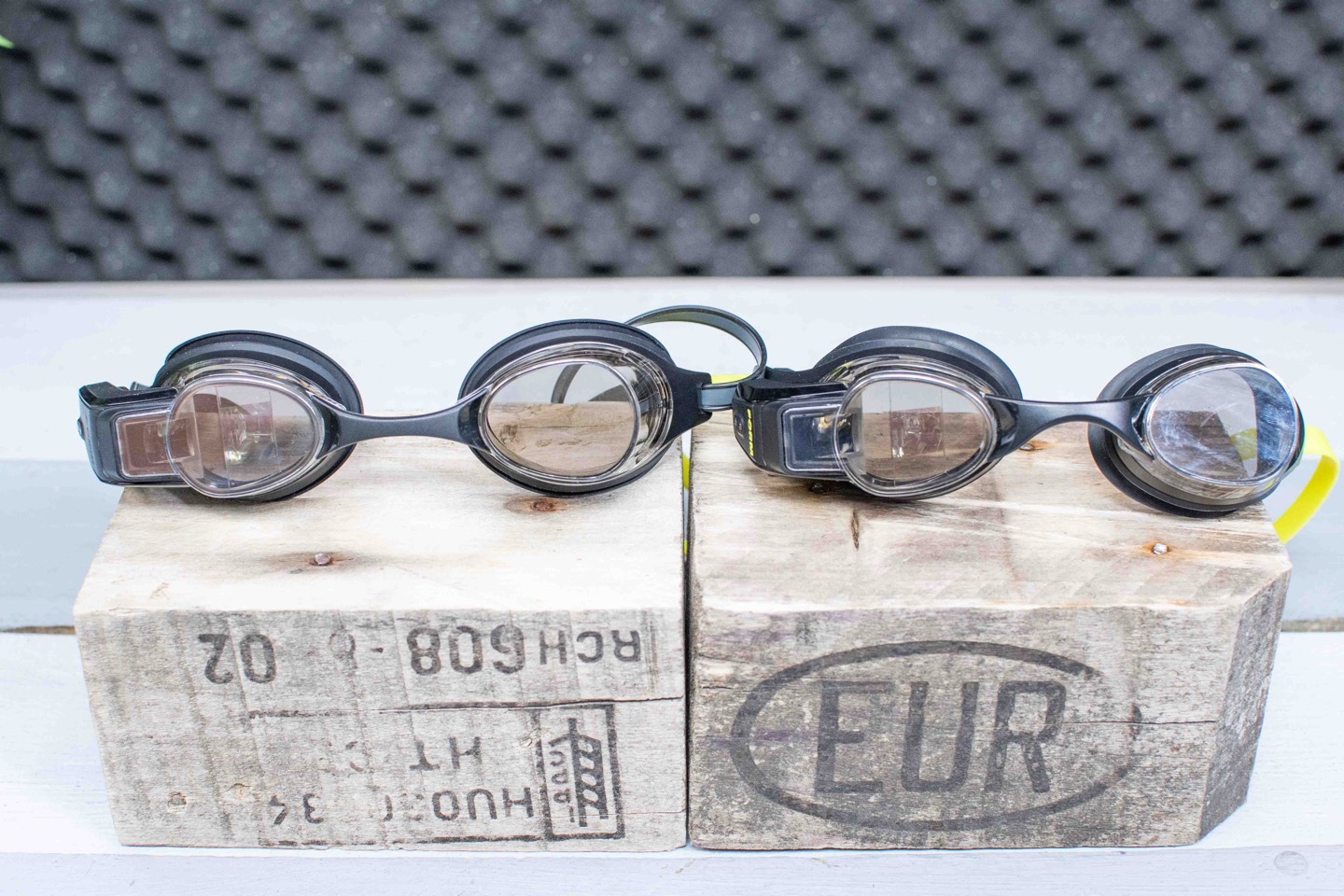
You can see the slight differences in the pod size here, with V2 having a smaller tech pod portion, but an elongated plastic portion that holds the optical HR sensor.
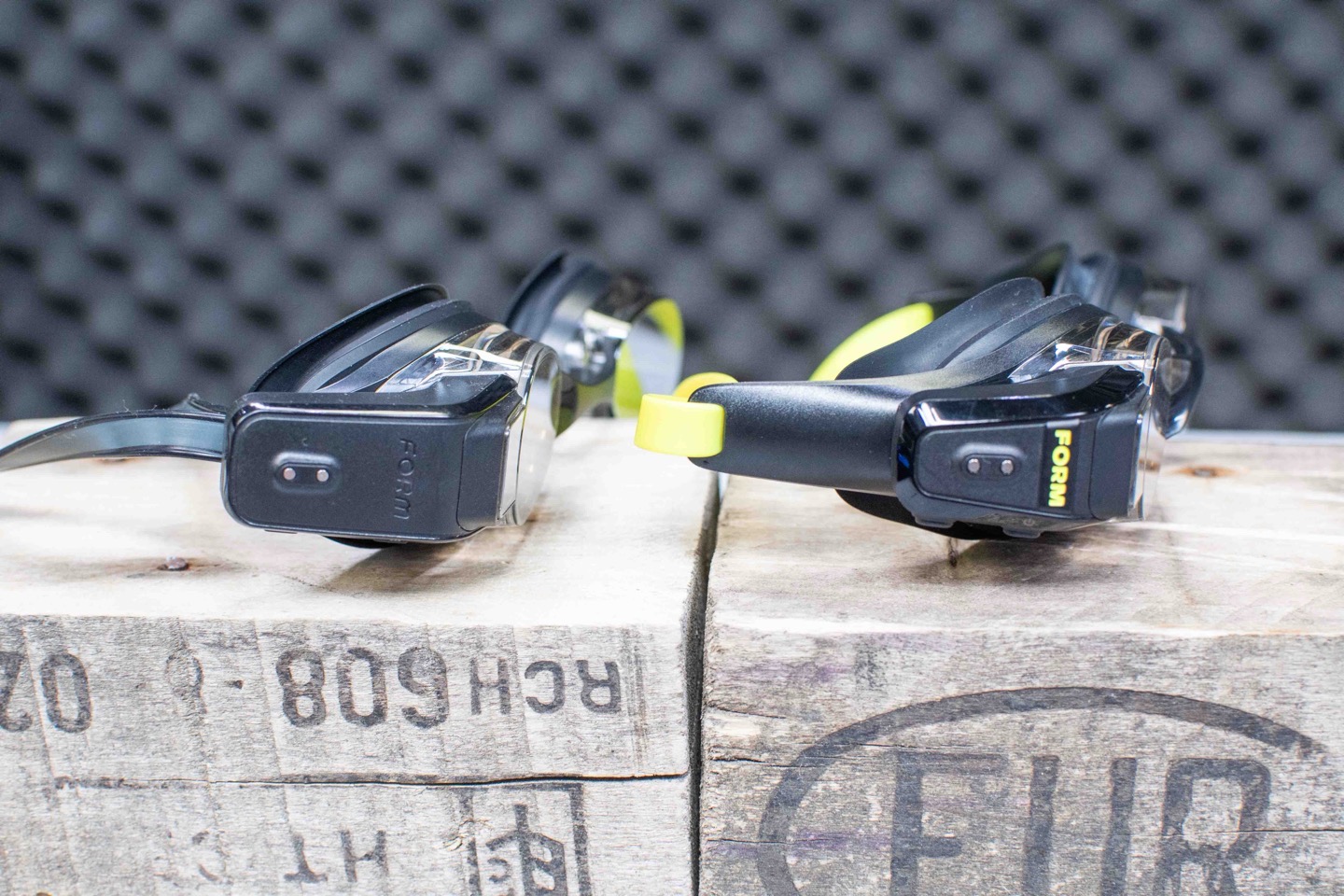
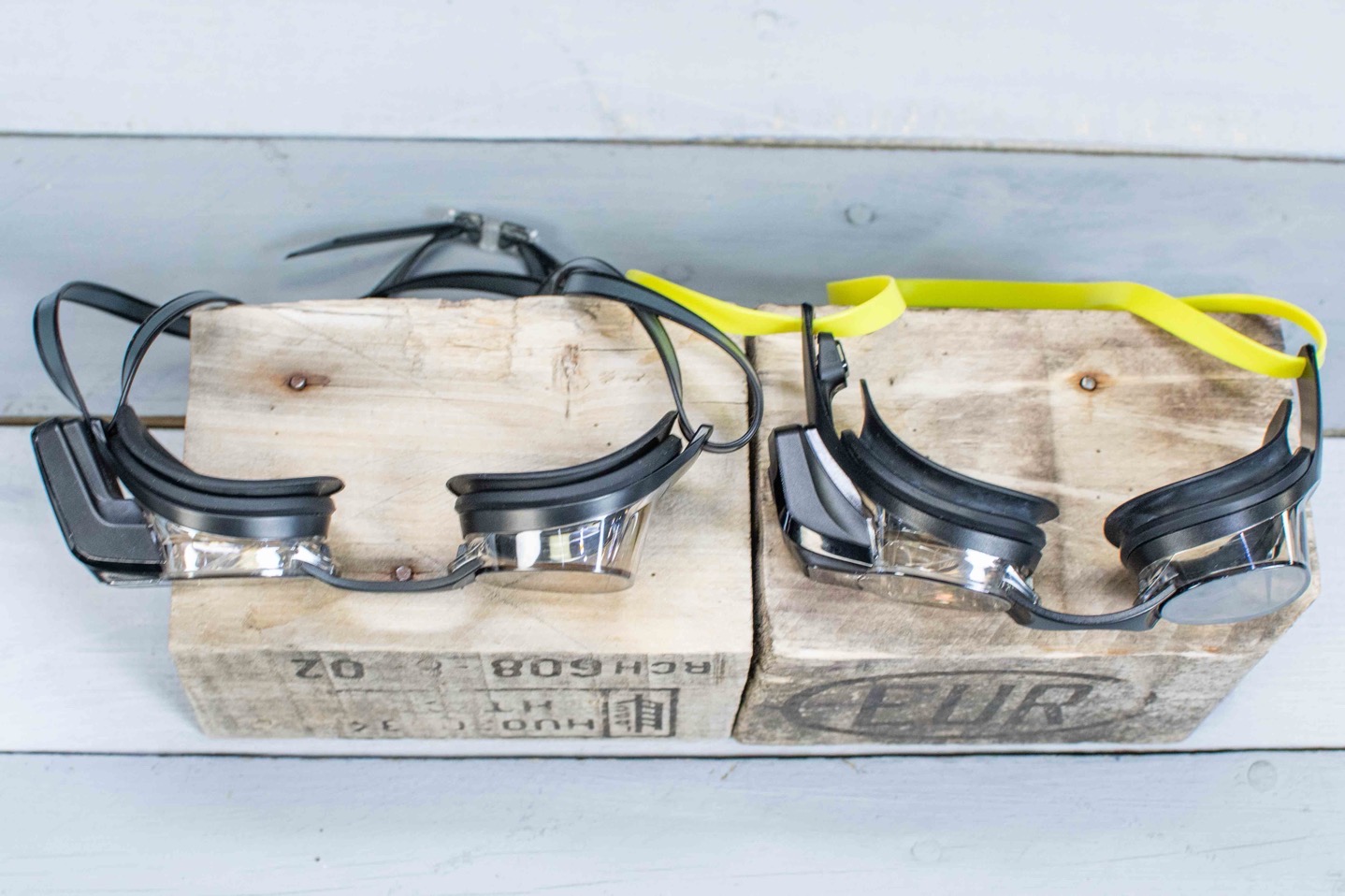
Oh, and for funsies, the V2 version comes with a different carrying case. The previous one looked like a hot dog, the new one does not look like a hot dog.
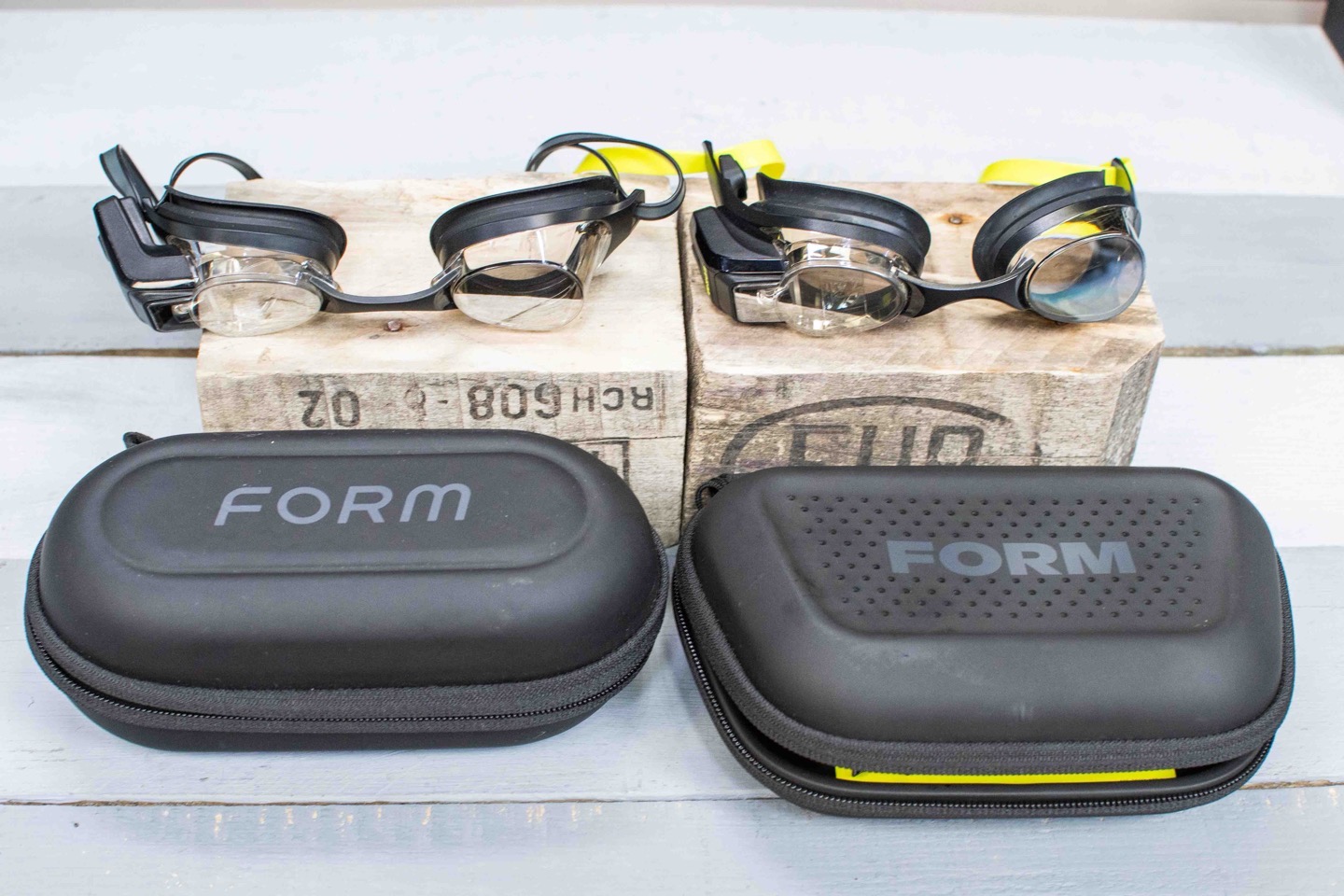
Practically speaking, either case would work just fine. Obviously the goal here being to reduce scratches on the lenses. That said, about half the time post-swim I’ll use the case, and half the time I’ll be lazy and throw it in my swim bag with all assortment of things. So far, no scratches, but certainly that’s different than a year or two’s worth.
In the Box:
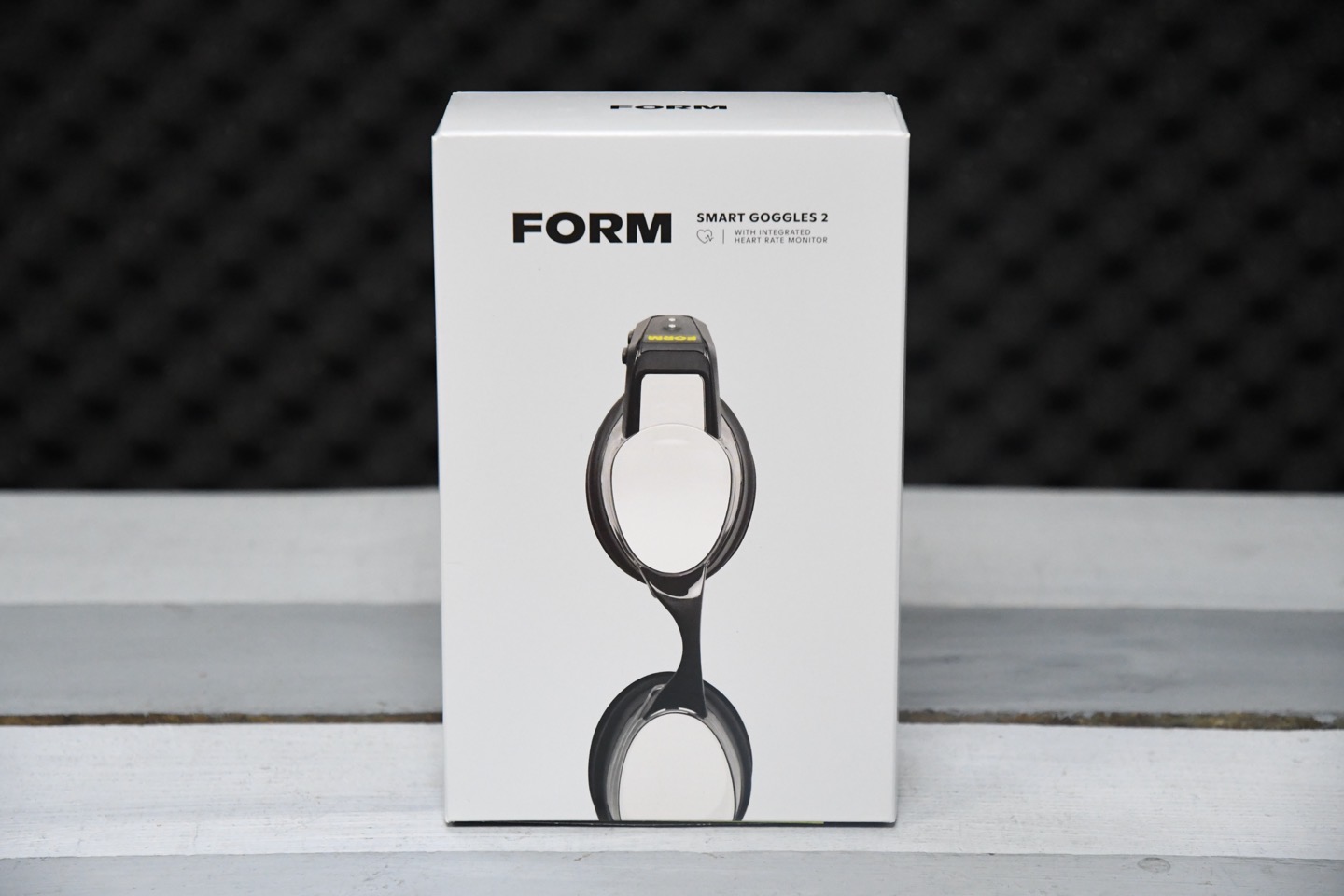
When it comes to what’s in the box, things are pretty straightforward.
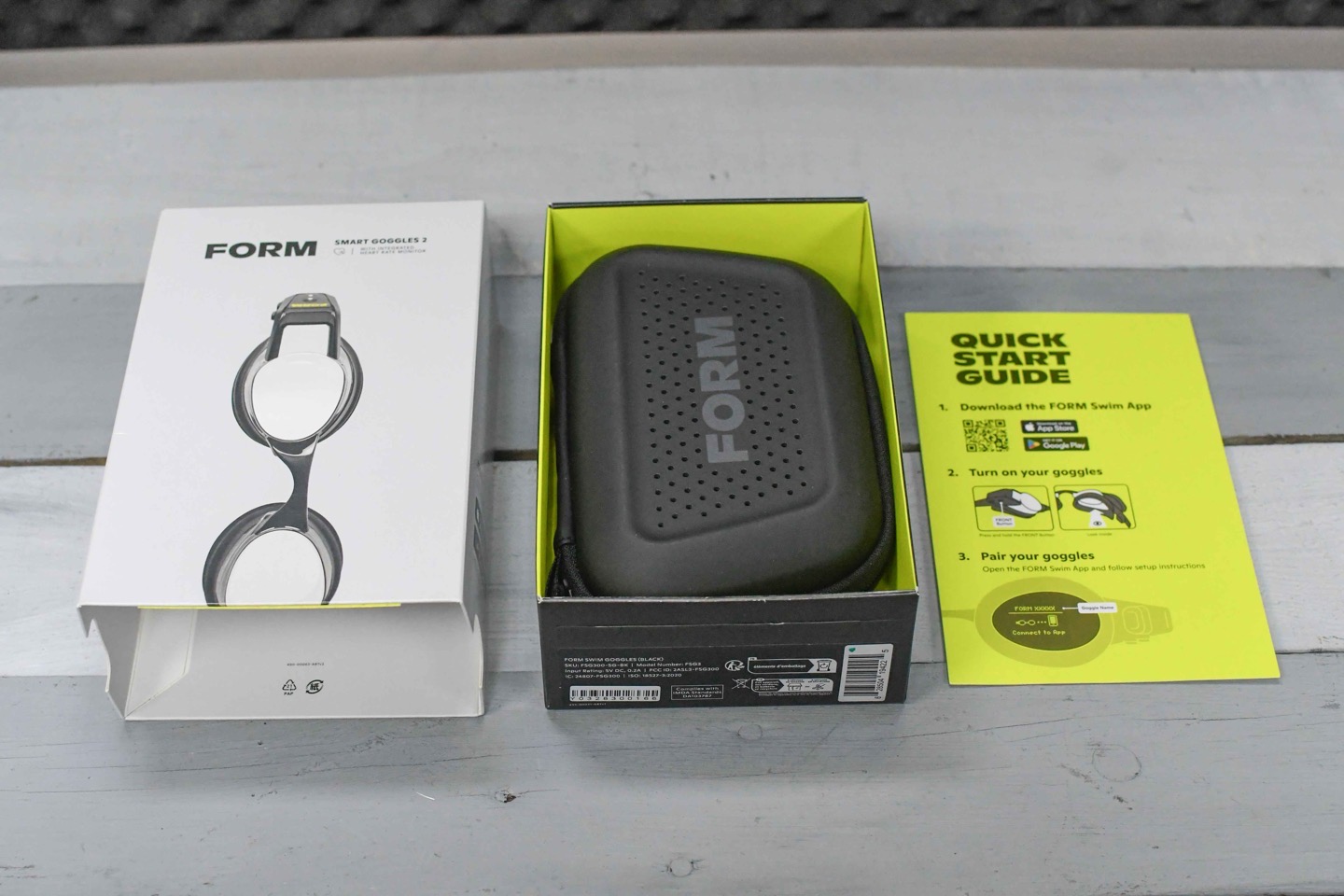
You’ve got the goggles, a goggle carrying case, a charging cable, and then a slate of different nose bridge pieces. If you’ve ever had issues with leakage or fit on a pair of goggles, more than likely you probably should have poked at swapping out the nose bridges. Thus, do play the field a bit here.
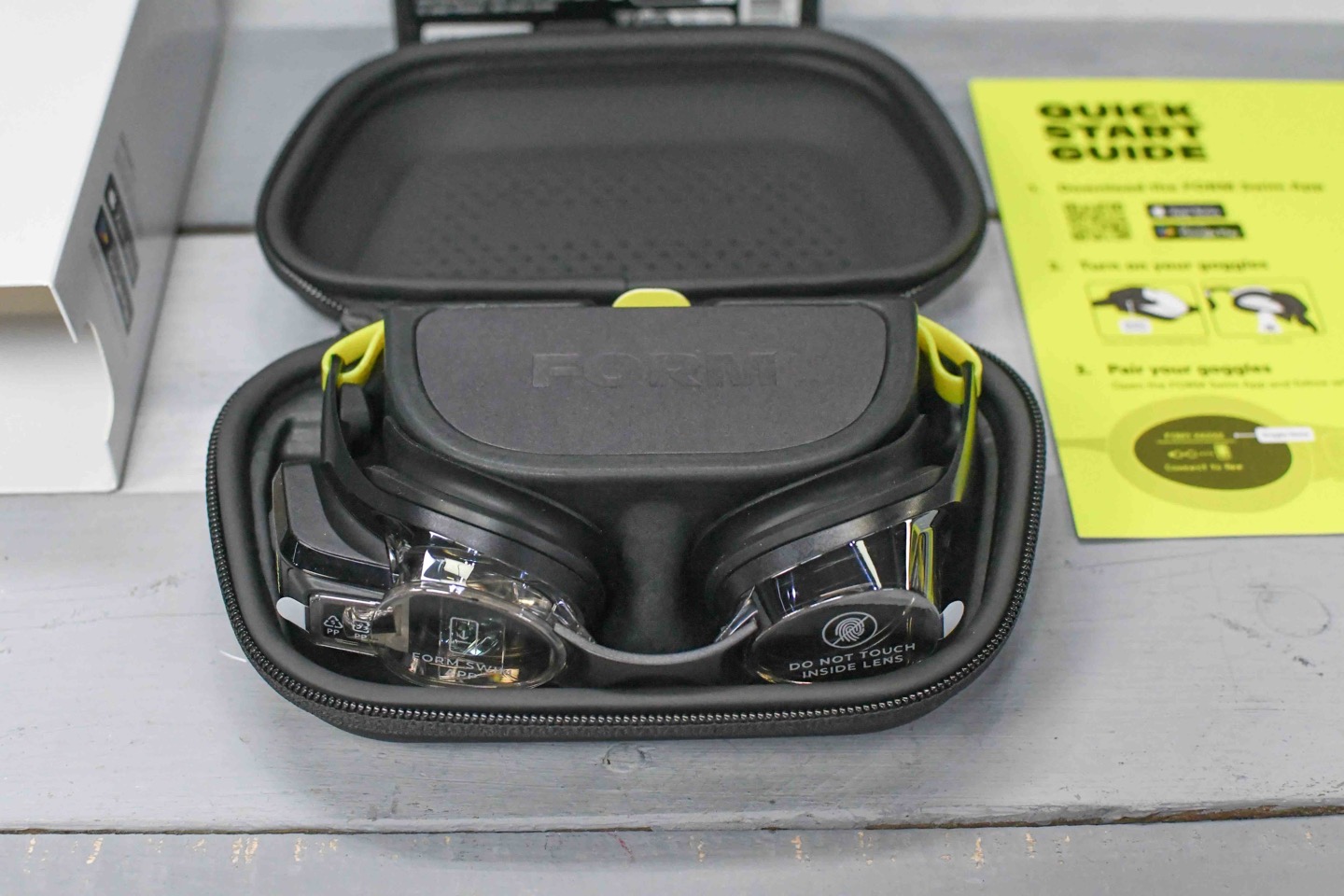
Oh, and there’s some paper stuffs. Obviously, you’ll ignore that after reading this review. But you’ll find the extra nose bridges, as well as a charging cable in there too.
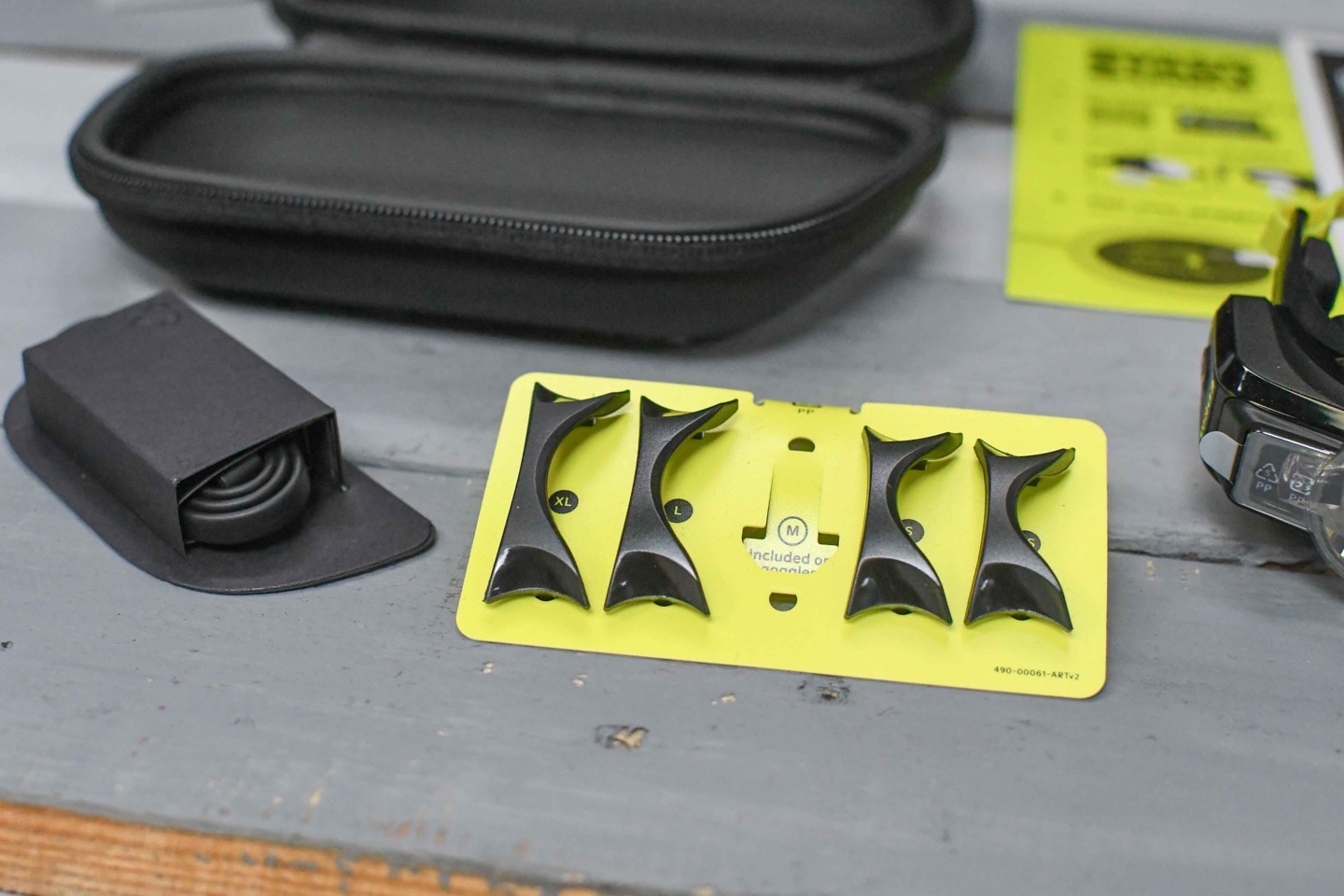
You’ll want to top off the charge on the goggles, as well as get it synced up to the app to update the firmware and ensure you’re on the latest. For that, let’s hit up the next section.
Basic Usage:
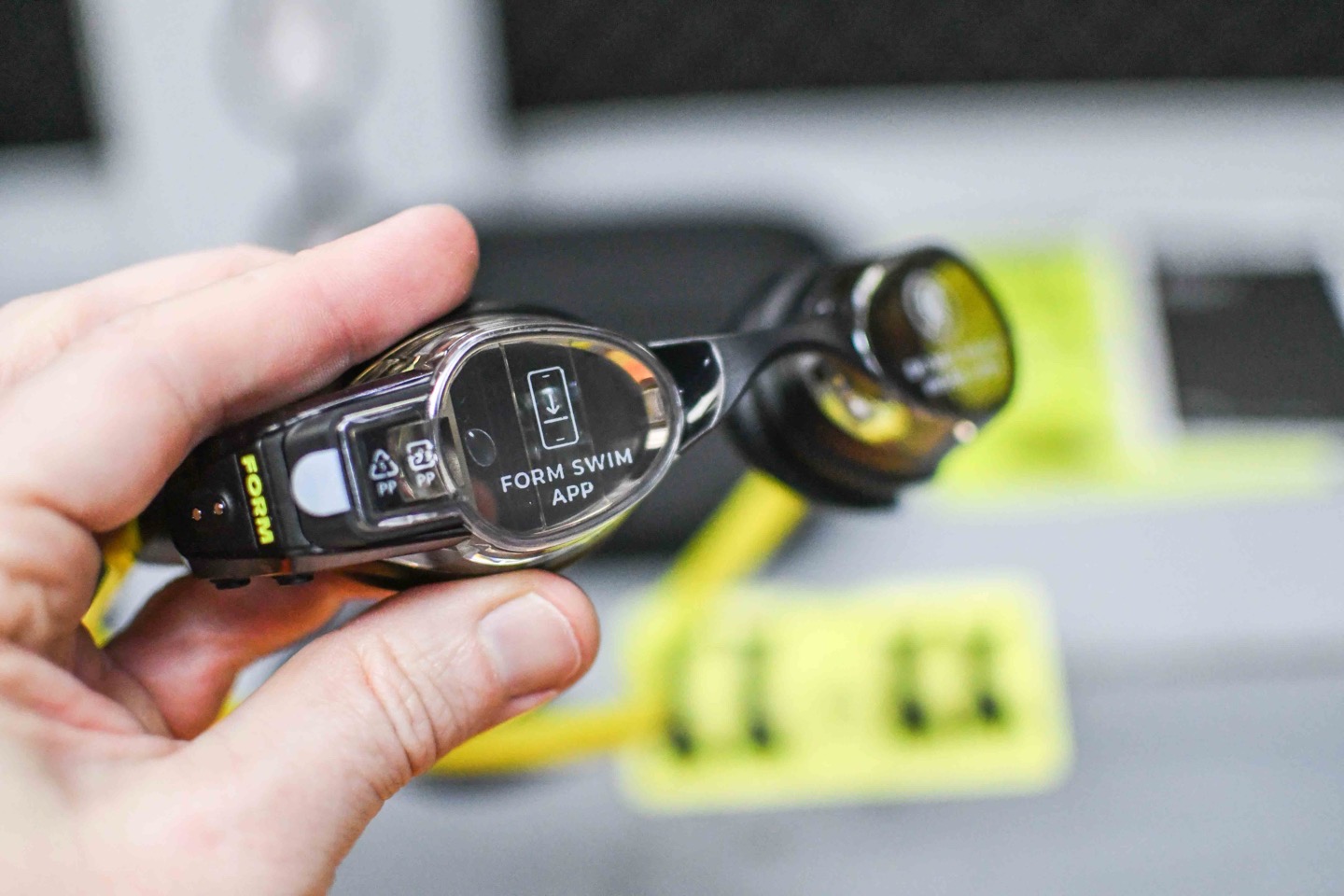
The first thing you’ve gotta do is pair up the goggles to the FORM app on your smartphone. This gets the goggles updated, as well as lets you make any configuration changes. This can be things like the data fields you want to use, but even just which side of the goggles you want the display pod to be on (right or left). Also, as part of this you may get a firmware update for the goggles.
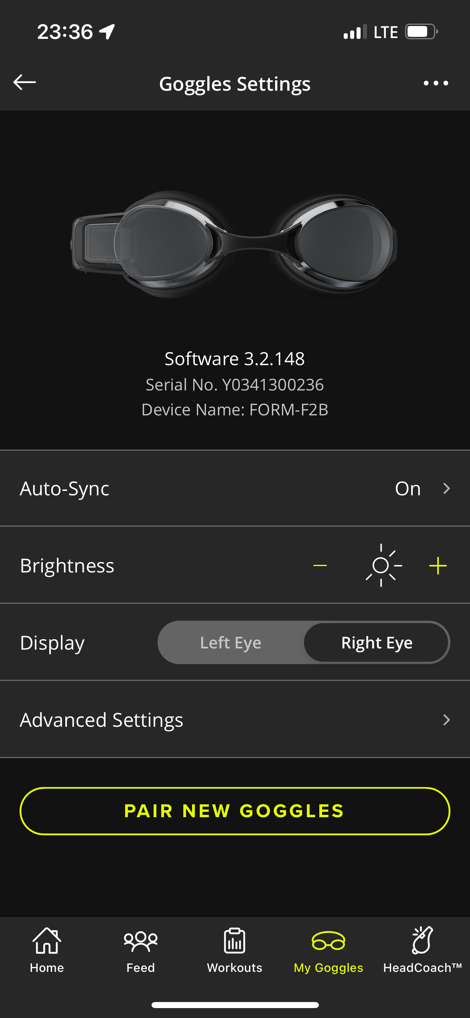
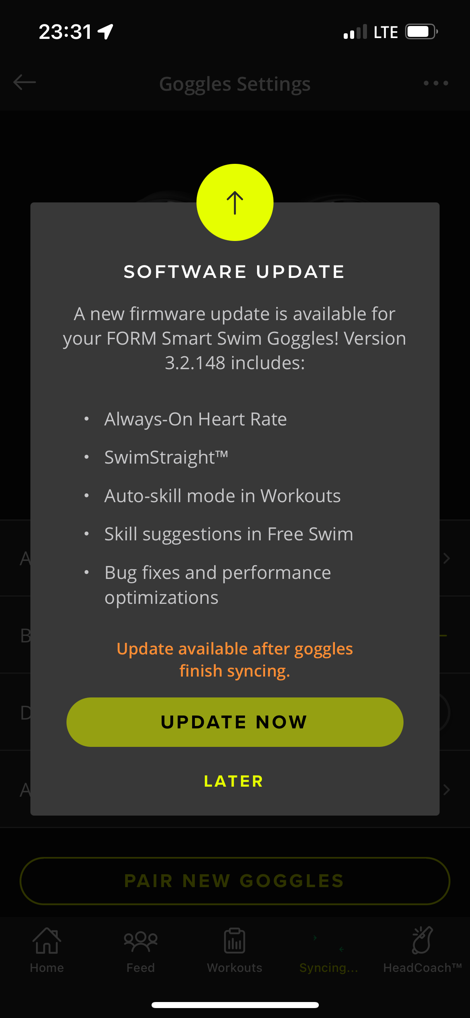
Which now is the time to mention that the display pod is only on one side of the goggles, though from a vision standpoint, while swimming, you’ll actually never think about it. Like literally, I’ve never once thought about it. The display just appears in the water in front of you, and all works out no matter which side you put it on (I’ve tried both, but prefer the right side). That said, you can change which side it uses, which effectively just flips the goggles over. You’d want to adjust the nose bridge accordingly as well if you do so.
Once you’ve got it paired up, you can tweak the so-called ‘Dashboards’ which are simply your data pages and data fields. These are grouped into fields/pages that you see while actively swimming, ones you see during recovery (in between sets), and ones you see right after a turn (while swimming). The world is your oyster here in terms of data fields, as long as that oyster has no more than three data fields per page.
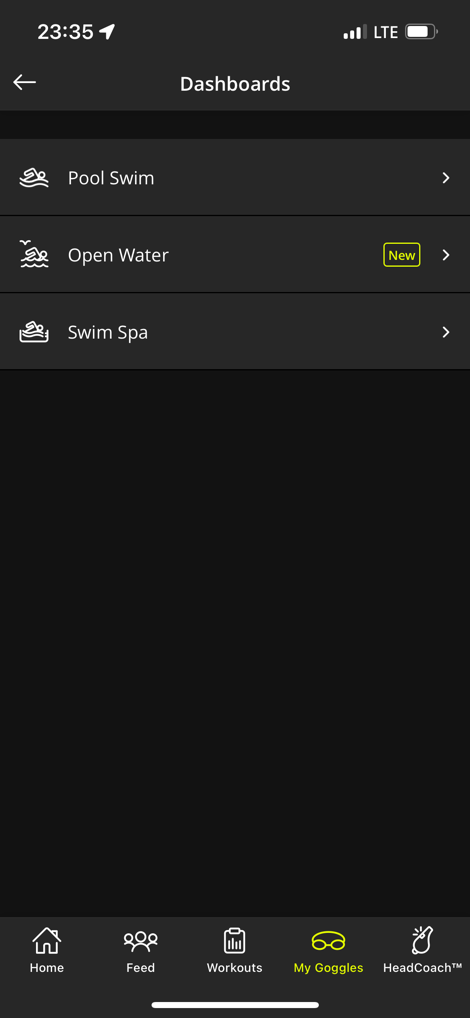
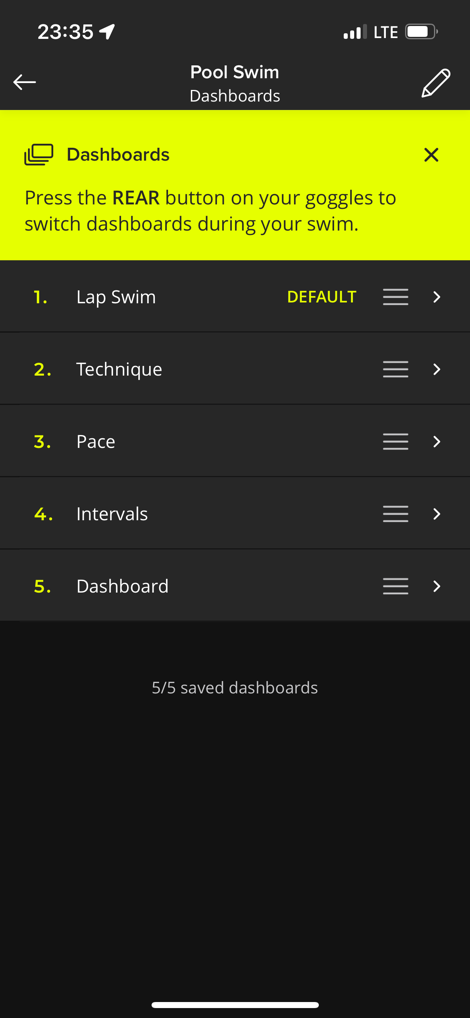
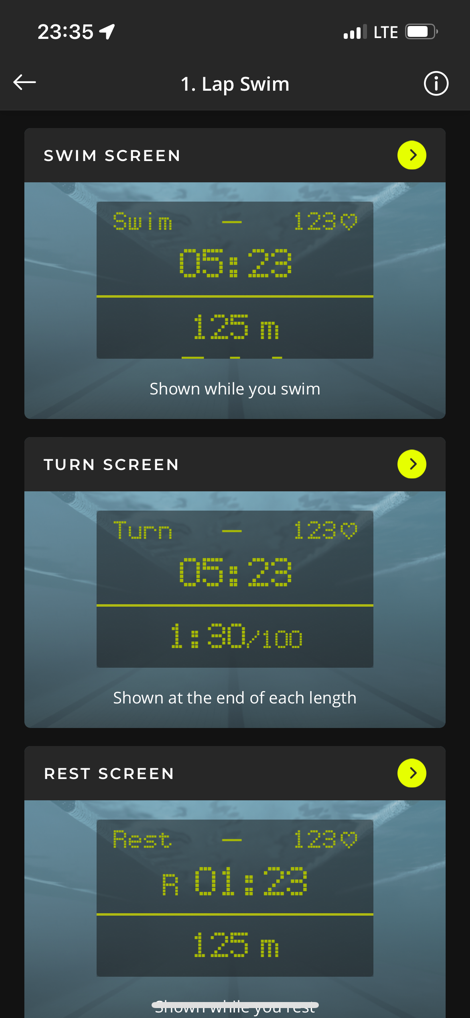
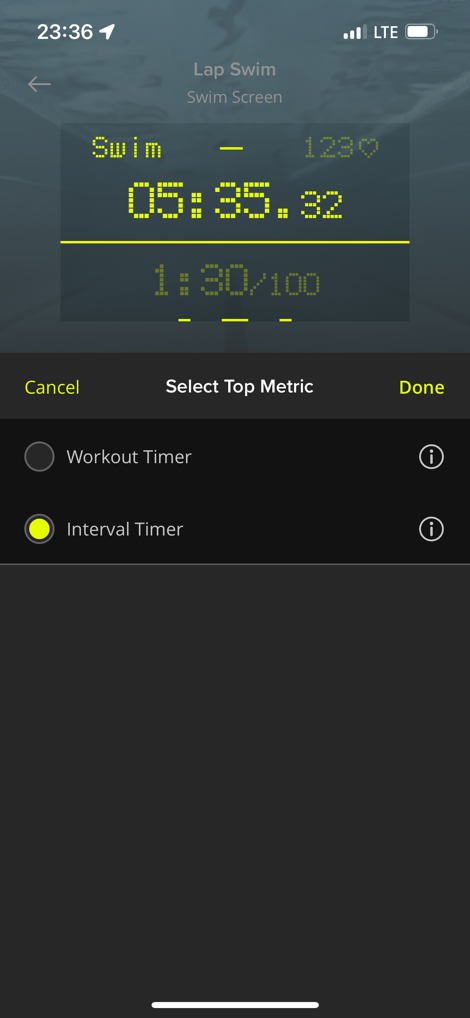
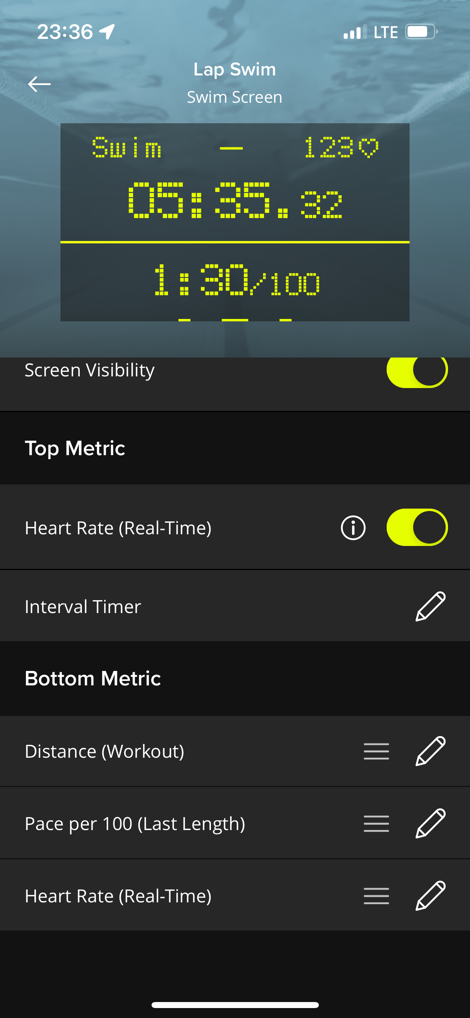
Also, for lack of anywhere else to put it, you’ll charge your goggles using the included cable. FORM claims 14 hours of battery life per charge, and that you can charge it for 10 minutes to get roughly a 2-hour swim. All that seems to pass the sniff test in my usage, though tracking the exact battery burn per swim wasn’t something I do (generally my litmus test for tracking it is if I have to think about charging that often, then it’s likely something I need to worry about).
With all that configured, you’ll head to the pool. Though, I suppose you might want to work on fit before you go to the pool. Still, put the goggles on and start adjusting. Remember, you’ve got those extra nose bridges if you want/need them. Once you’ve got it on your head, you’ll turn it on, and go ahead and select to do a pool swim. It’ll ask for the pool length, so it can track distance.
However, before you start swimming, stay on the page that shows your current heart rate. It’s this page that’s somewhat critical to check fit, as it shows whether or not it’s got a good lock on your heart rate using the optical heart rate sensor. That sensor needs to be up against the side of your head somewhat snugly to get good readings (or any readings).
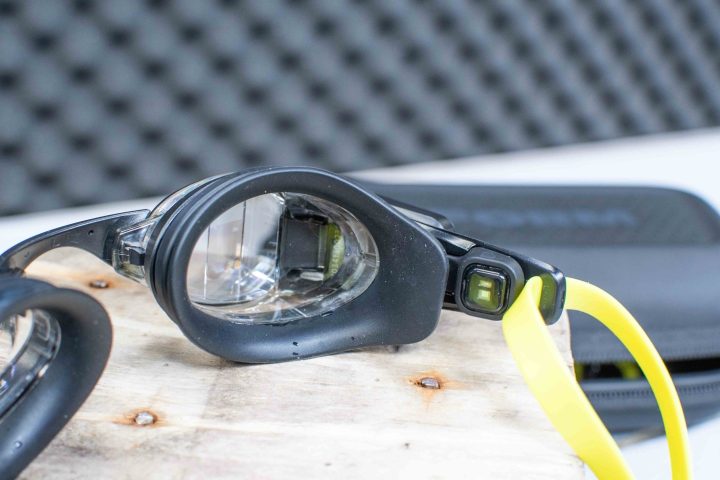
The first few swims I kept getting HR connectivity drops. Or rather, it was almost entirely HR drops, looking like this (that pink-red line shouldn’t stop):
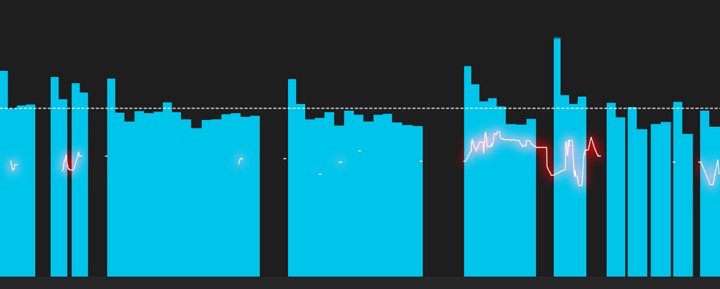
While I felt like the goggles were quite snug already, in talking to FORM, they recommended changing the strap position a bit (more spread out), as well as putting the goggles below my swim cap (which would effectively pull the goggles closer to my head). That did the trick, and from there out I was good to go with perfect HR connectivity every swim. Here’s the before and after:
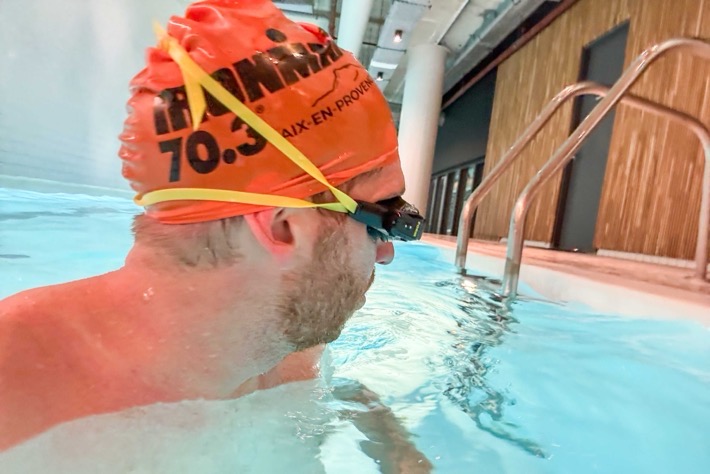
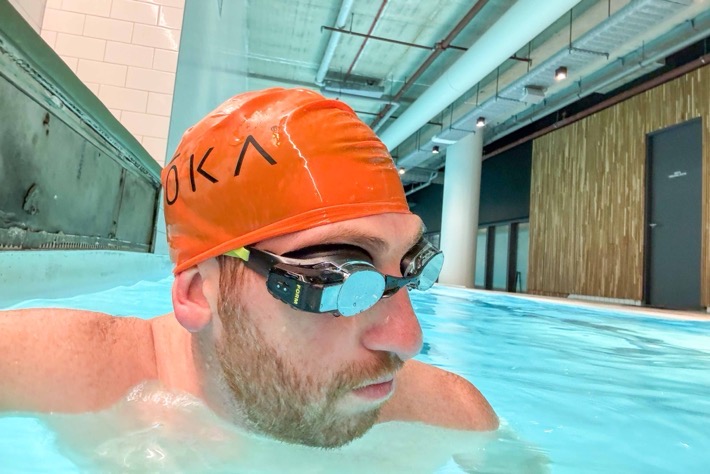
And here’s what the HR data looks like now:
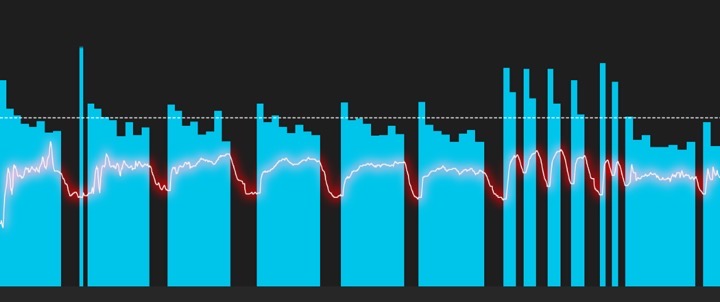
So, ready to swim, you’ll simply start swimming. In this section I’m going to focus on the basics, which is to say no structured workouts. Meaning, you might be doing a structured workout of your own, but the goggles aren’t involved in that. If you want the goggles to iterate through a structured workout, that’s the next section.
As soon as you start swimming, it’ll start tracking. It’s really that simple. It’ll show your stats automatically for all the metrics you’ve selected, including distance, time, pace, or anything else. Of course, the magic part here is the display clarity. It’s very difficult to show on camera, because a camera lens shoved into the goggles simply doesn’t come out well (nor what it looks like to your eyes). For example, here’s my phone camera lens shoved in there:
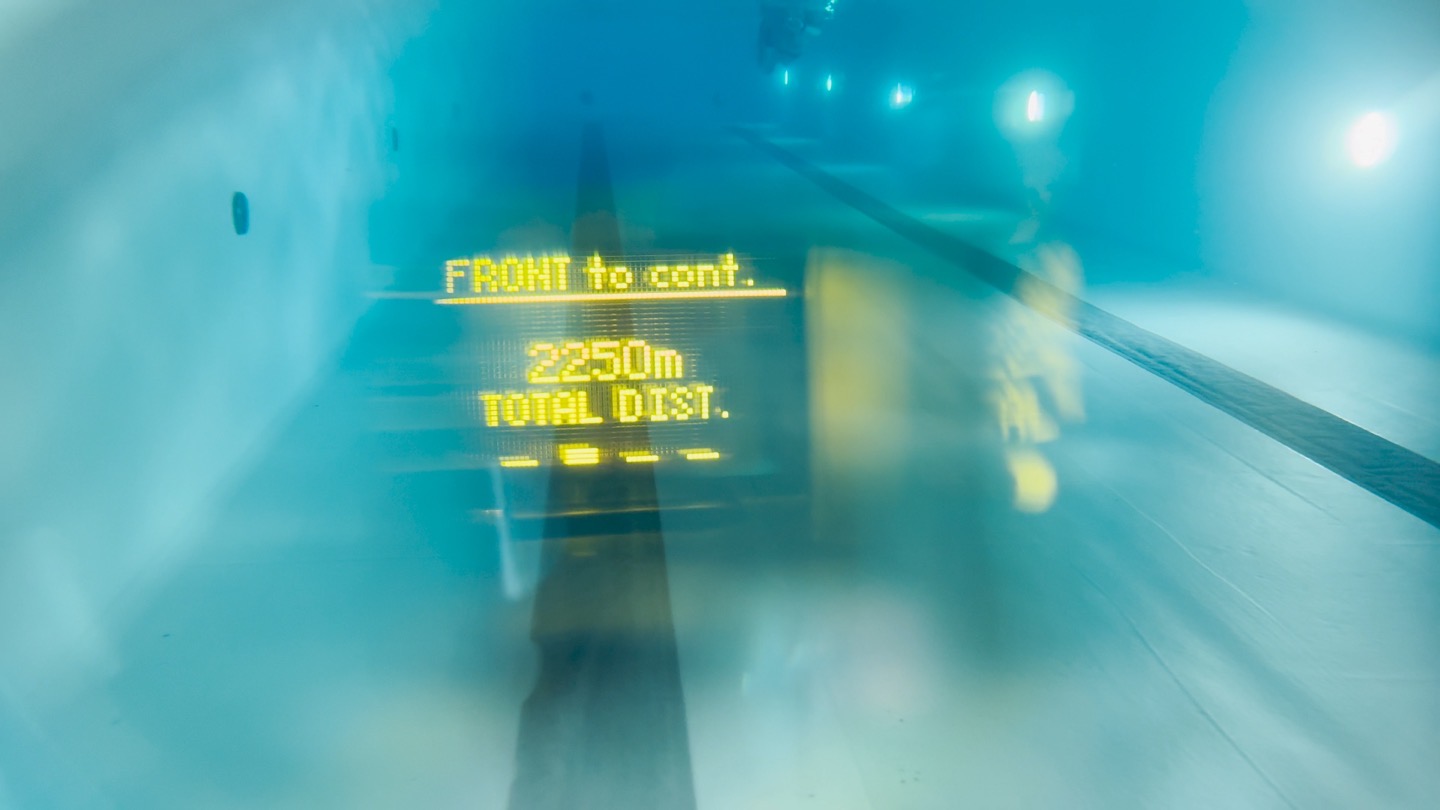
And yet, here’s what it actually looks like:
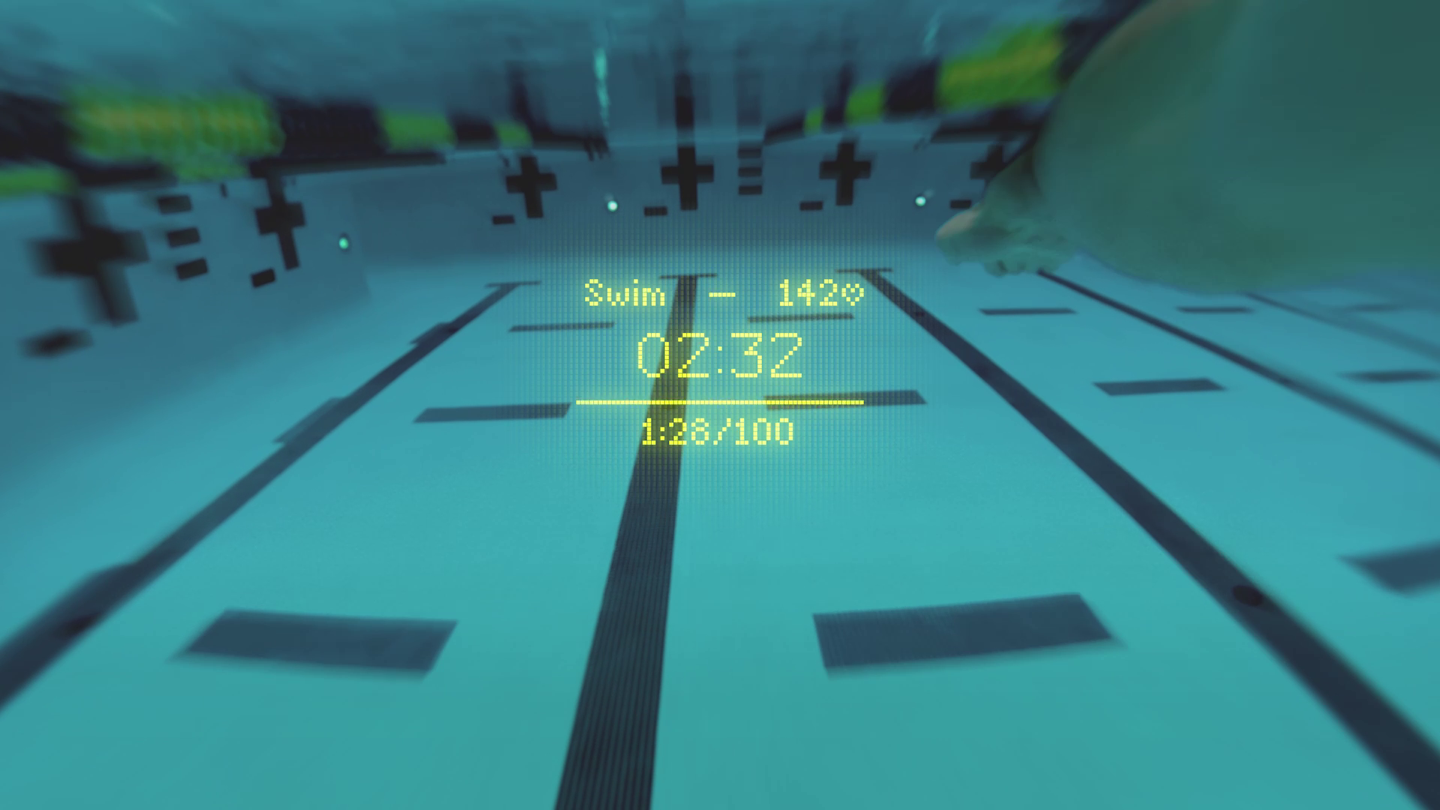
The above is an image from FORM, but in real-life it’s virtually the same. Unlike most wearable company photos that make watch displays look like 8K OLED TV screens (despite being very much not), FORM’s shots above are really that crisp and clear.
The singular downside to the goggles though is really the visibility out of them. Not forward-looking, but peripheral vision, for which there is very very little. It was my complaint with the V1 goggles, and remains my complaint with the V2 goggles (since they are identical). Whether it be in the pool, or openwater swimming, it’s extremely reduced vision to the sides, which makes things like passes (in busy pools/lanes) slightly harder – but frankly more importantly, it just makes it more boring, because you can’t see much around you in adjacent lanes.
When it comes to tracking turns, it’ll track both flip/tumble turns, as well as open (not flip) turns. Said differently, no mater how you get yourself going back the other direction in the lane, it’ll track that. The accuracy of that timing seems pretty solid, with the exception that the first length of each set seems a bit short – as if the algorithm detecting you leaving the wall off a recovery break takes an extra second or so to trigger. Subsequent lengths are perfectly fine though.
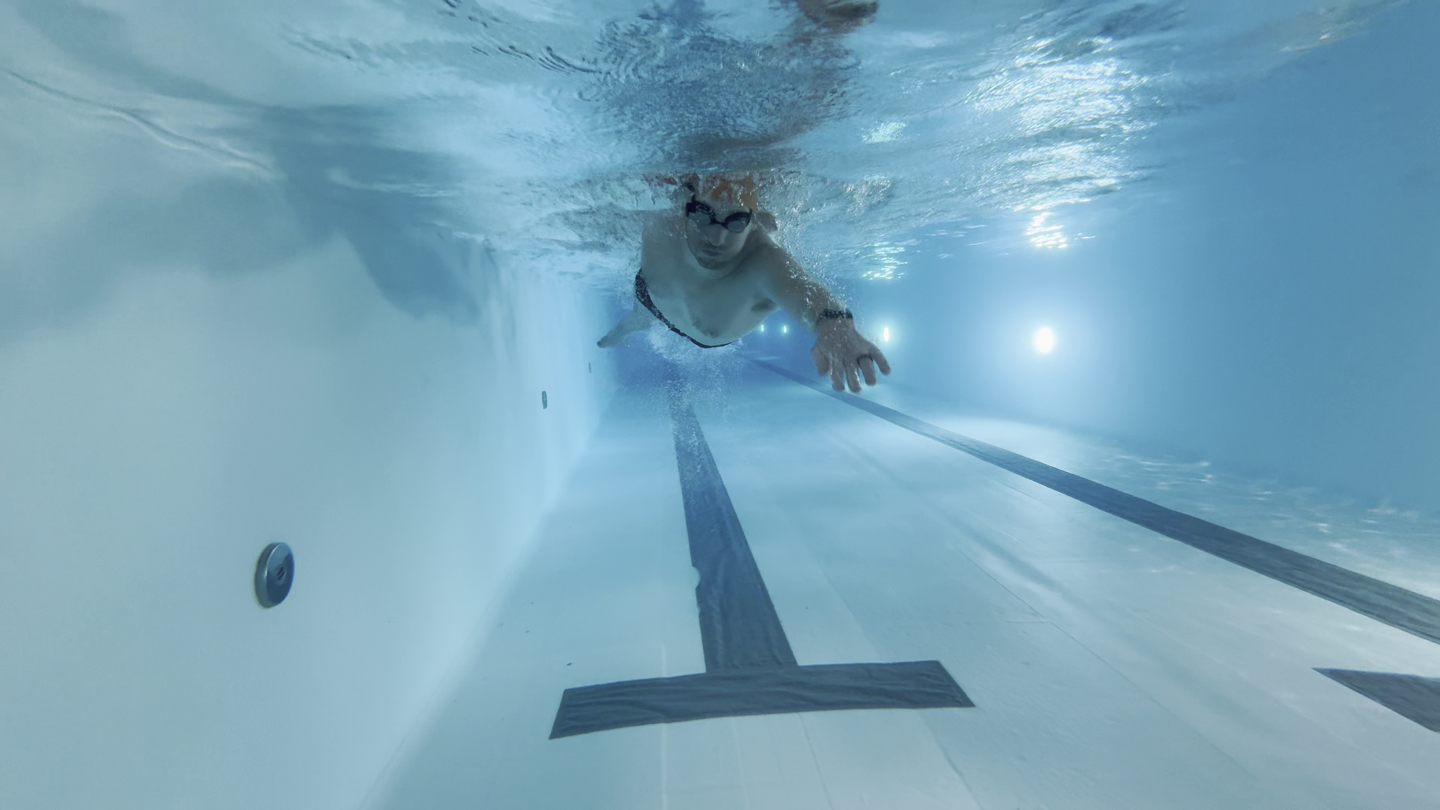
In terms of accuracy, I’ve yet to have a missed length on FORM. It’s astonishingly good, even when I have to stop mid-lane for someone doing something stupid, or if I have to pass someone, or if I completely botch/whiff a flip turn before the wall and end up just turning around non-gracefully – all works great. Note that recovery breaks are automatically tracked – you don’t ever need to press anything, ever. Just swim, or stop, or do whatever you want, and it’ll track you automatically.
From a stroke recognition standpoint, as a triathlete, I only do freestyle. So I can’t really comment on stroke recognition for the other ones, because even if I were to pretend to do them, I’d probably be doing them wrong anyways.
Speaking of which, at the end of a swim, you’ll get your stats on the FORM app for that swim. Note that the only thing that requires a subscription in these stats is the ‘FORM Score’, otherwise, everything else is included in the base stats.
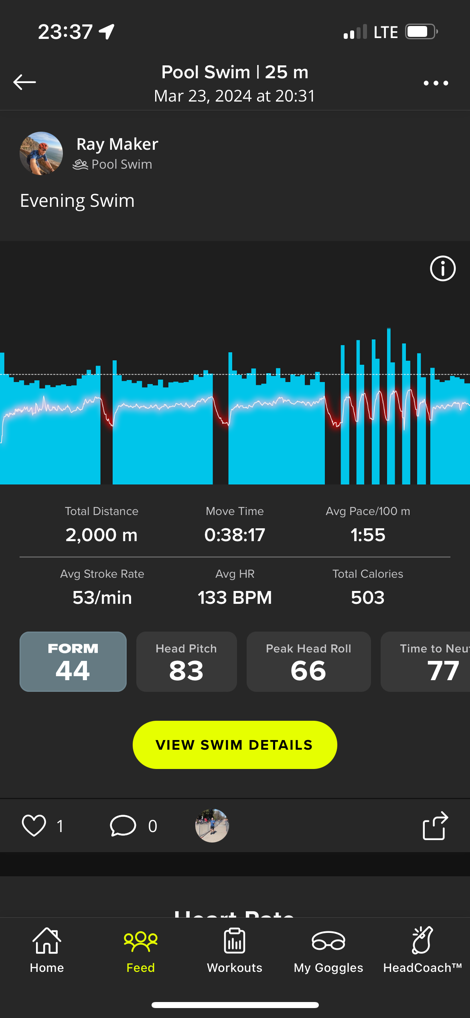
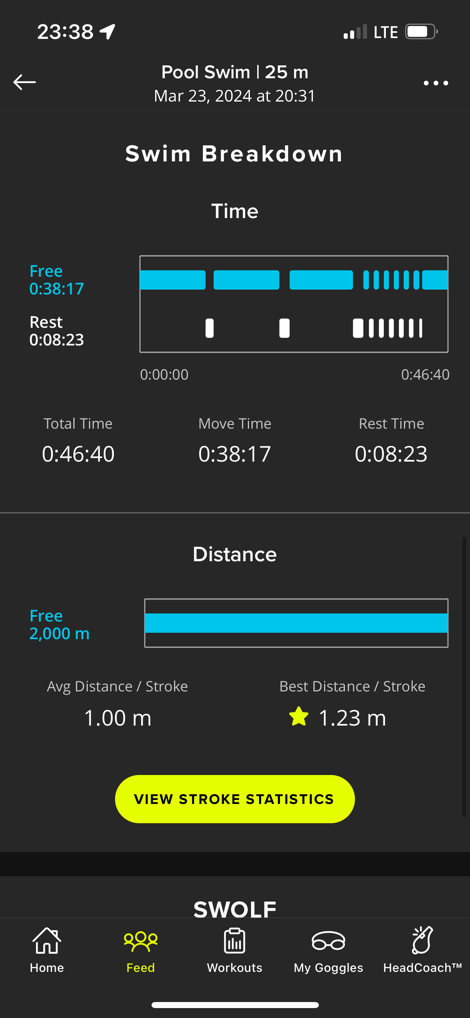
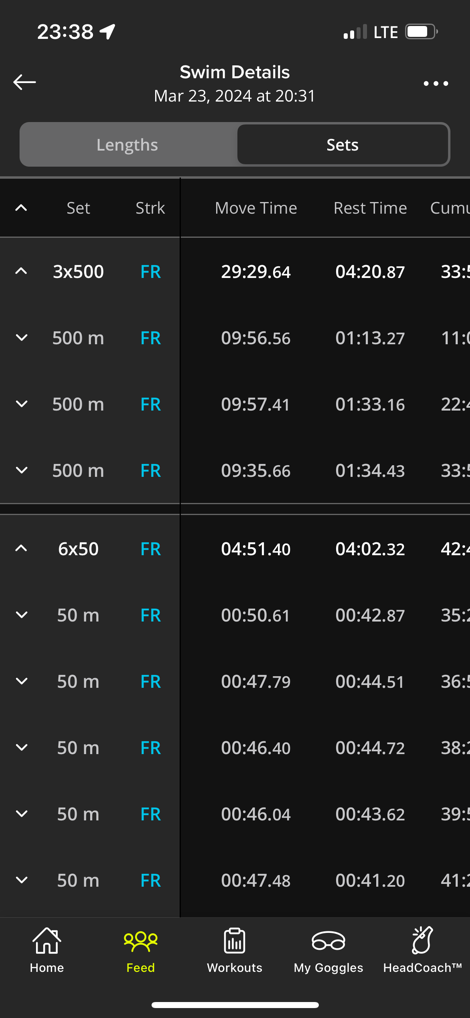
Note you’ll see your heart rate shown automatically on the charts, that’s the thin red/pinkish line.
If you’ve got Strava or TrainingPeaks, it’ll automatically sync to those platforms as well, showing something akin to this:
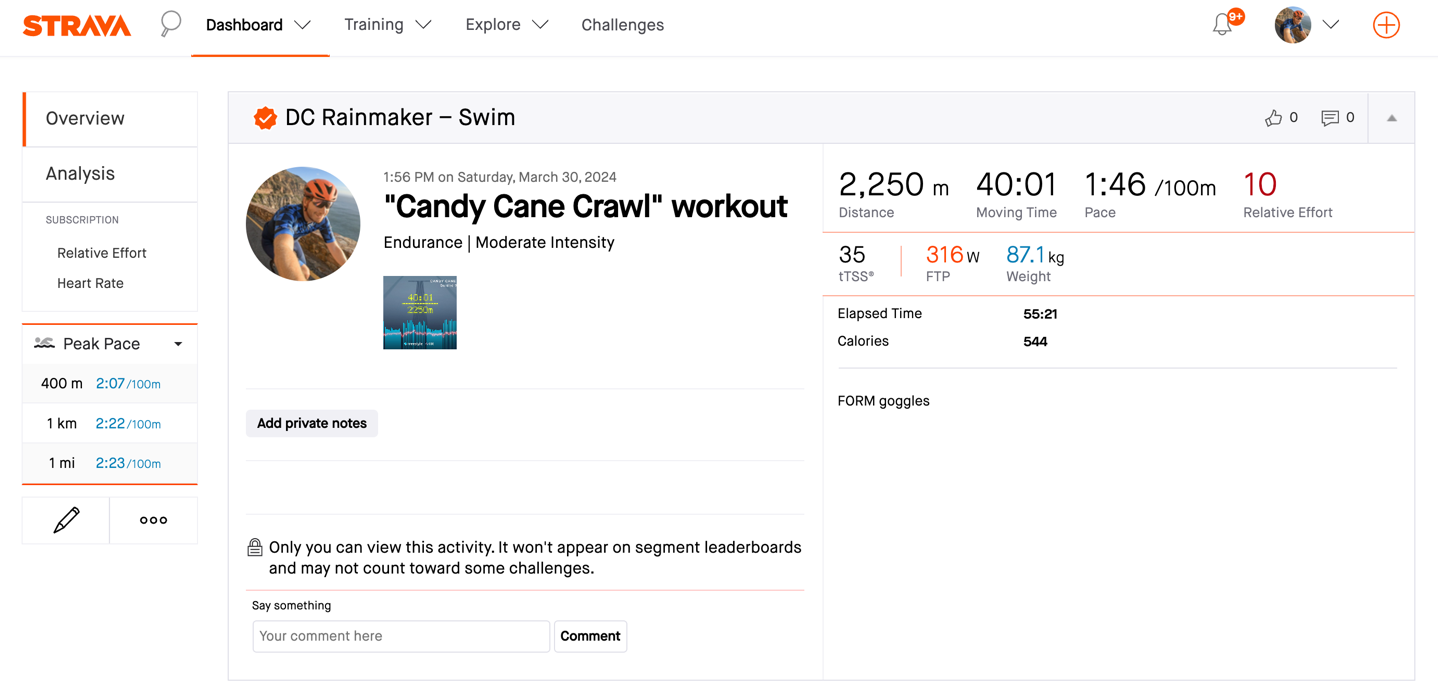
The syncing process usually only takes a few seconds after you finish your swim, once the FORM app is opened up.
Overall, I think the biggest benefit of the goggles compared to a smartwatch tracking, is that you don’t have to play games with your wrist during the lane turn to see the stats mid-set. Further, unlike some watches which require manual button presses for tracking sets/breaks (or if they do have it, does it poorly), this just does it all automatically – and works flawlessly.
As a quick note on my wife’s usage, at this point she’s put in about 25,000m on the V2 goggles, and is pretty darn happy with them. Like me, she’s not thrilled with the visibility aspects, but in terms of the data and ease of use, she’s not even bothered recording on her Garmin watch some of the time (which is what she previously had tracked swims with). The ‘just works’ factor is exceptionally high for her.
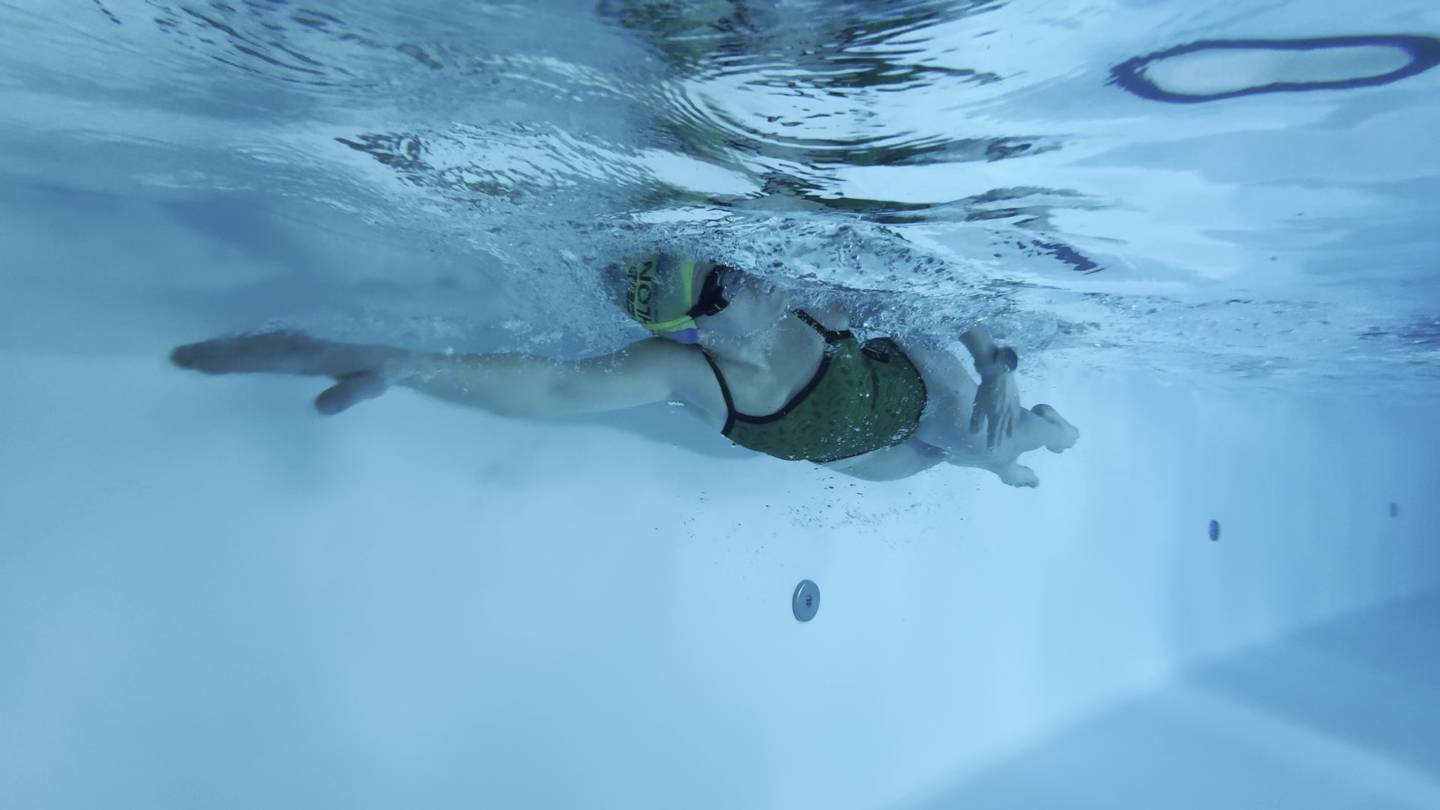
For her swims, she’s following a manually prescribed workout from her coach (so she’s not using the structured workout portions), and then her completed FORM swims sync to TrainingPeaks after the fact for her coach to check. Overall, she’s pretty darn happy.
Structured Workouts & Coaching:
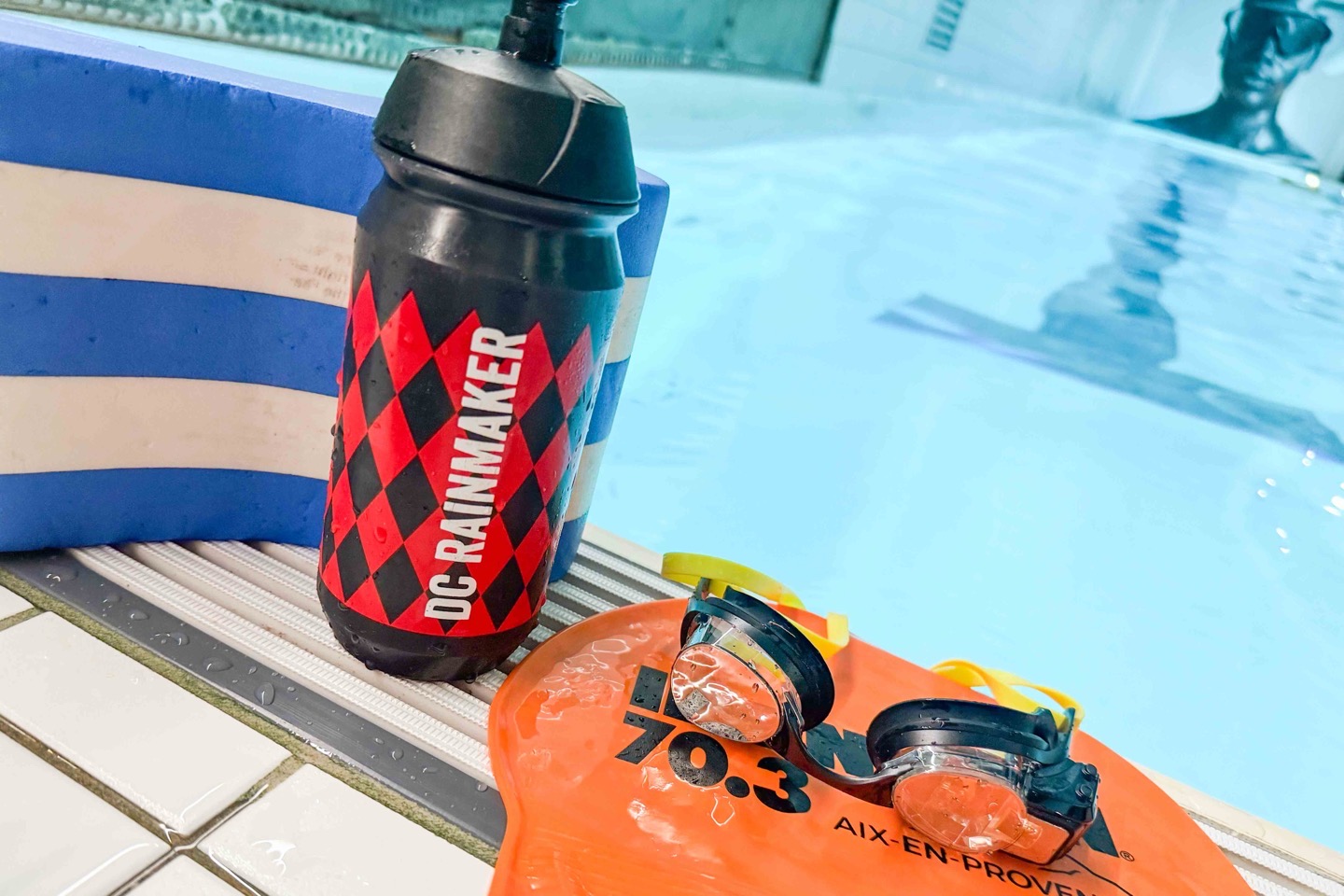
Now, the first thing to understand about structured workouts and coaching bits, is that everything here requires a subscription. That costs $15/month, or $99/year. The goggles include a free 2-month trial to said subscription. I’ve never been a big fan of this model, and FORM has tried countless models over the last few years. At one point it was a hardware-only play, then it was hardware+subscription play, then subscription only, then only if you agreed Hawaiian pizza was the best, and so on. Now they’ve settled back on a hardware price for base features, and a subscription price for extra features.
In any case, here’s the specific features which are only available with a subscription:
– SwimStraight compass for openwater swimming
– 1,500+ workouts with instructions in your goggles
– 45+ training plans
– TrainingPeaks integration, import your TrainingPeaks/plan workouts
– Workout builder, create your own custom workouts
– FORM Score that rates your swimming efficiency
– HeadCoach technique analysis components
Thus, in a nutshell – anything and everything structure or coaching-wise, is paywalled. However, other app features, like analyzing your completed workouts, do not require a subscription.
So, diving right into things, you’ve got four core options when it comes to choosing and doing structured workouts (where it iterates you through all steps of the workout):
A) Create your own custom workout
B) Choose from 1,500 pre-created workouts
C) Sync from TrainingPeaks
D) Select a FORM training plan, which has specific workouts for that plan goal
Starting off on the plan side of things, there’s a boatload of plans available. Some of these are technique-focused, some of them are distance-focused, and some of them are event-focused. There are also triathlon plans as well. The triathlon plans are for all the major distances, but don’t include the bike/run portions – just the swim side of things.
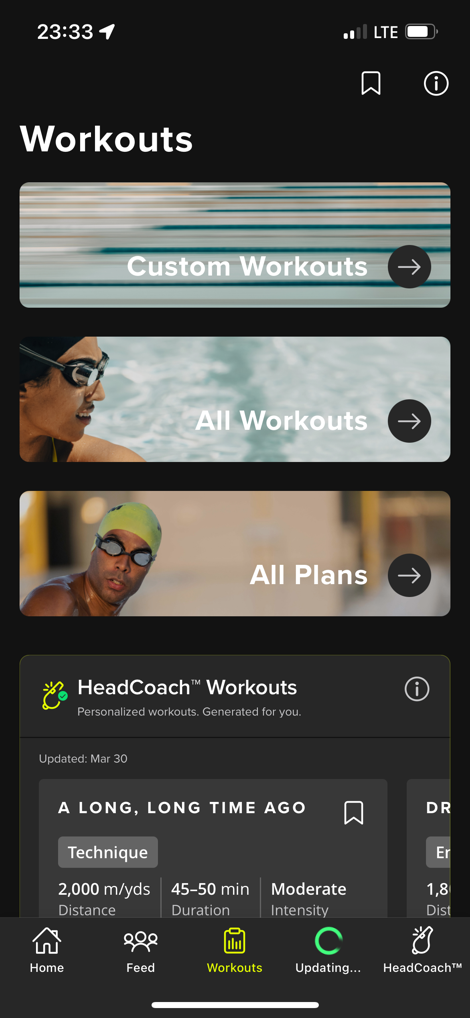
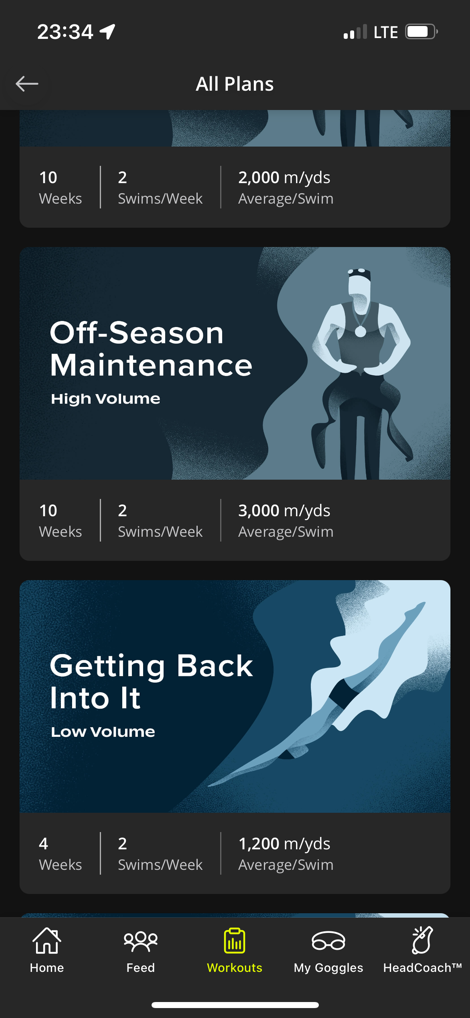
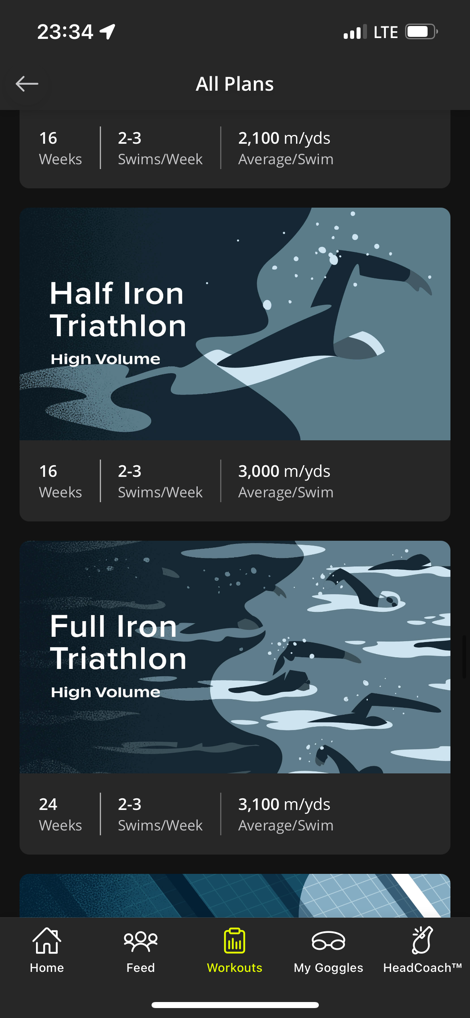
Within a given plan, you’ve got specific workouts that are done per week.
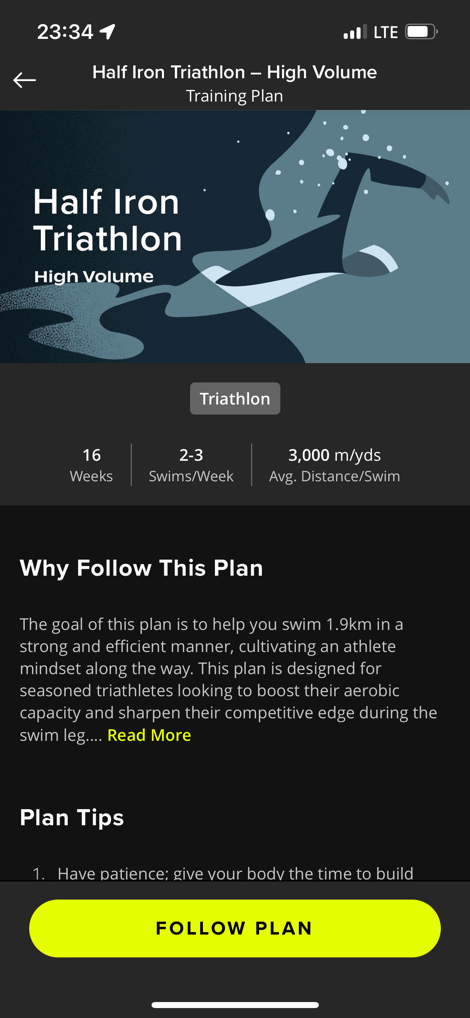
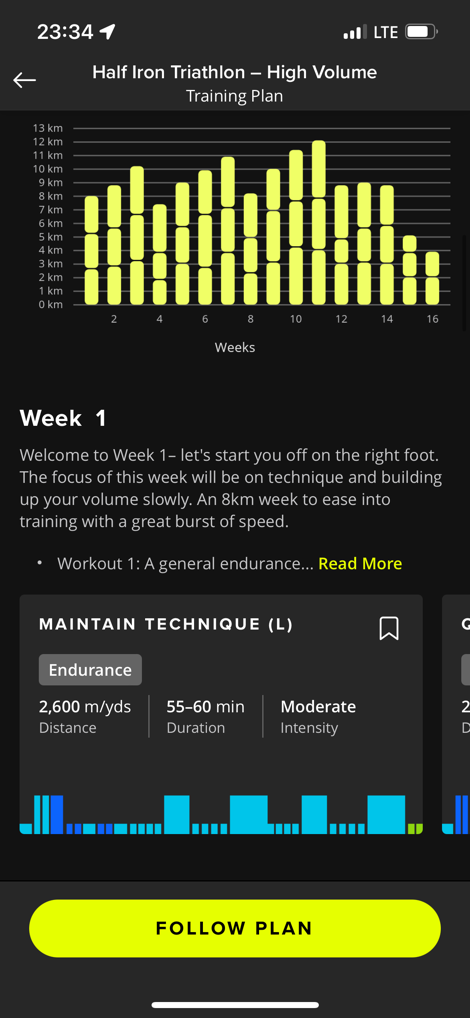
These workouts are pulled from the larger library of 1,500 workouts to choose from, for just about every distance and focus area:
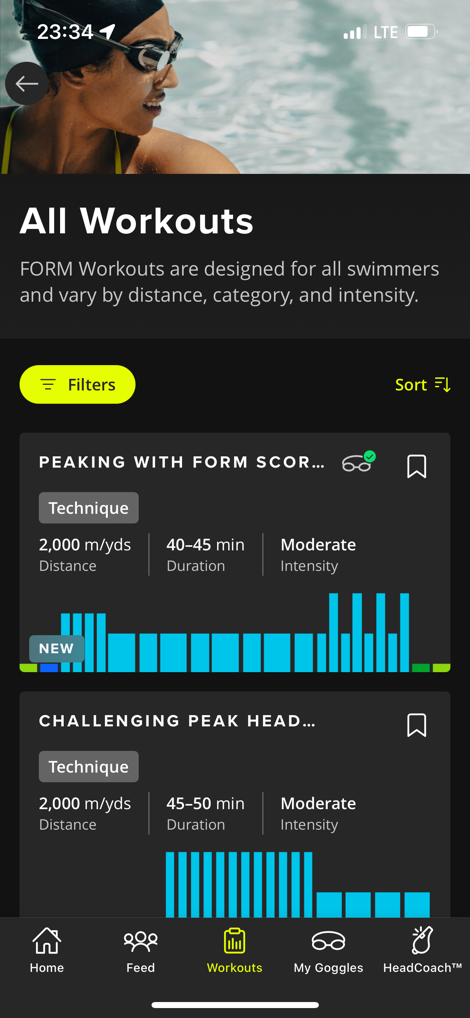
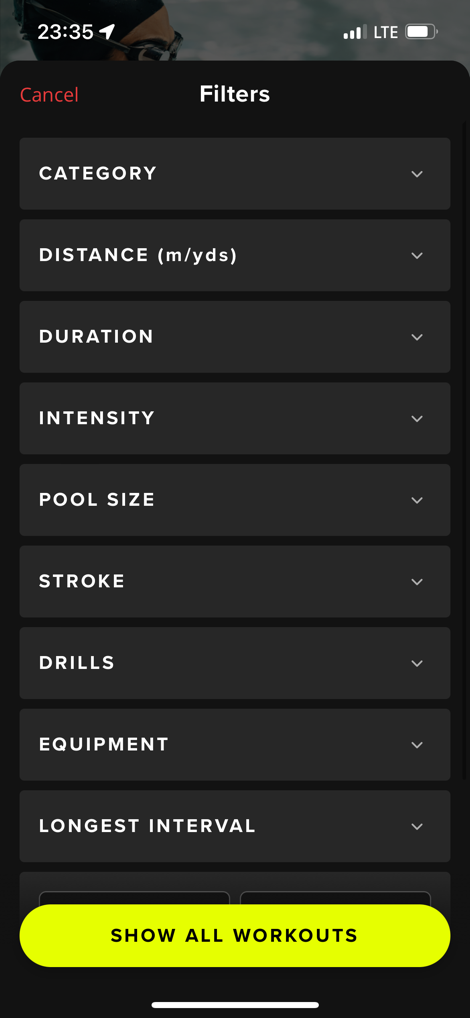
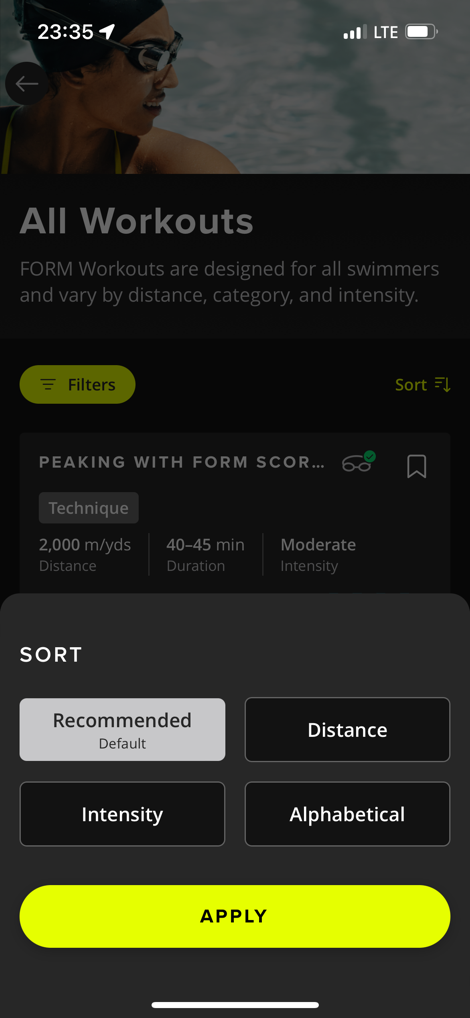
It’s literally an insane number of swim workouts. Though functionally speaking, no different than the numbers that companies like TrainerRoad or Peloton would have for cycling. There’s a number of different filtering options to pretty easily find something colorful enough to meet your needs, which given the sheer quantity here, is really what you’re looking at.
You can open up any workout and dive into the nuances of it. Also, you can copy and tweak a workout too. Say you find something you like the format of, but want to add an extra set to it – you can do that pretty easily with the copy function.
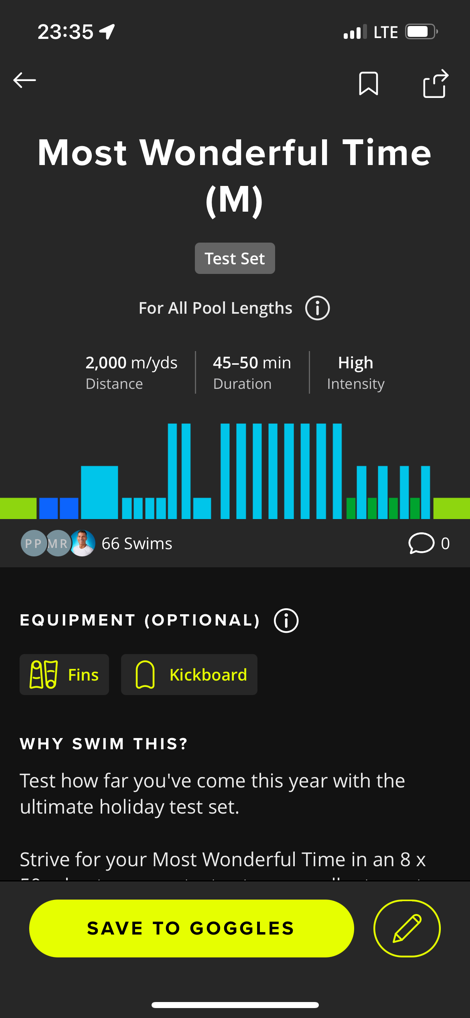
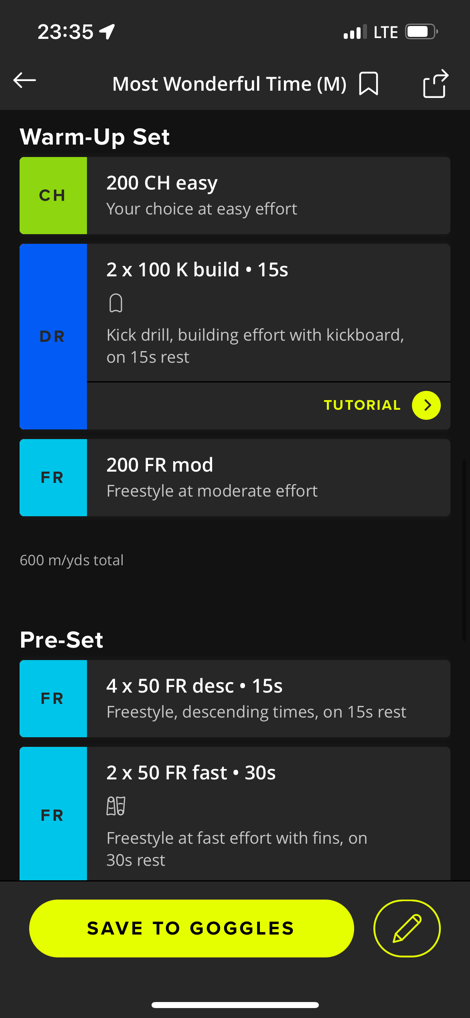
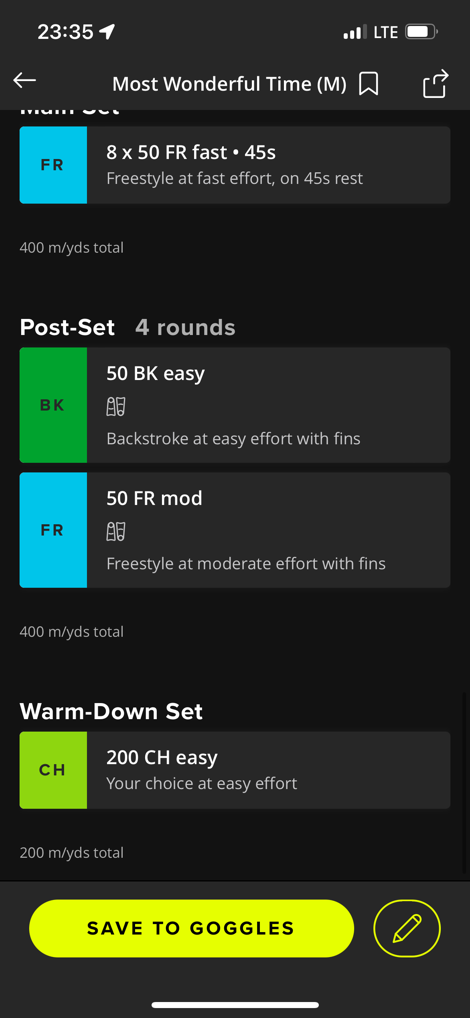
Likewise, you can also just create your own custom workouts as well. This is what I did for the prescribed workouts from TrainerRoad (where I have a triathlon training/race plan). Frankly, it’s a bit of a pain in the ass to do each week (ok, a lot of a pain in the ass). And thus, I’m highly considering just picking a matching FORM triathlon plan for that distance, and then going with that for the swim portion. But if you’re just doing a one-off it’s not a big deal.
Likewise, if you’ve got TrainingPeaks workouts, then those too will automatically show up in the goggles. But again, all of this requires a subscription to leverage. It’s a point that’s (rightfully) frustrated a lot of people. No other device that I’m aware of in the entirety of sports tech requires a subscription to create custom workouts, or do workouts from TrainingPeaks. Certainly – requiring a subscription to use FORM’s training plans or pre-created workouts makes total sense to me. But I’ve never been behind requiring it for other workouts.
In any case, setting aside that policy/business annoyance, the actual execution is really damn good. You’ll sync the workouts to your goggles (though, only 5 at a time), and then you’ll choose them at at the start of a swim.
As you start swimming, it’ll simply list exactly what you’re supposed to be doing for each set and recovery times. It’ll automatically count down recovery periods and then notify you how much is left in each set, as well as any intensities. Again, it’s incredibly difficult for me to capture anything mid-workout camera-wise, so here’s what it’d show, from some of FORM’s imagery:
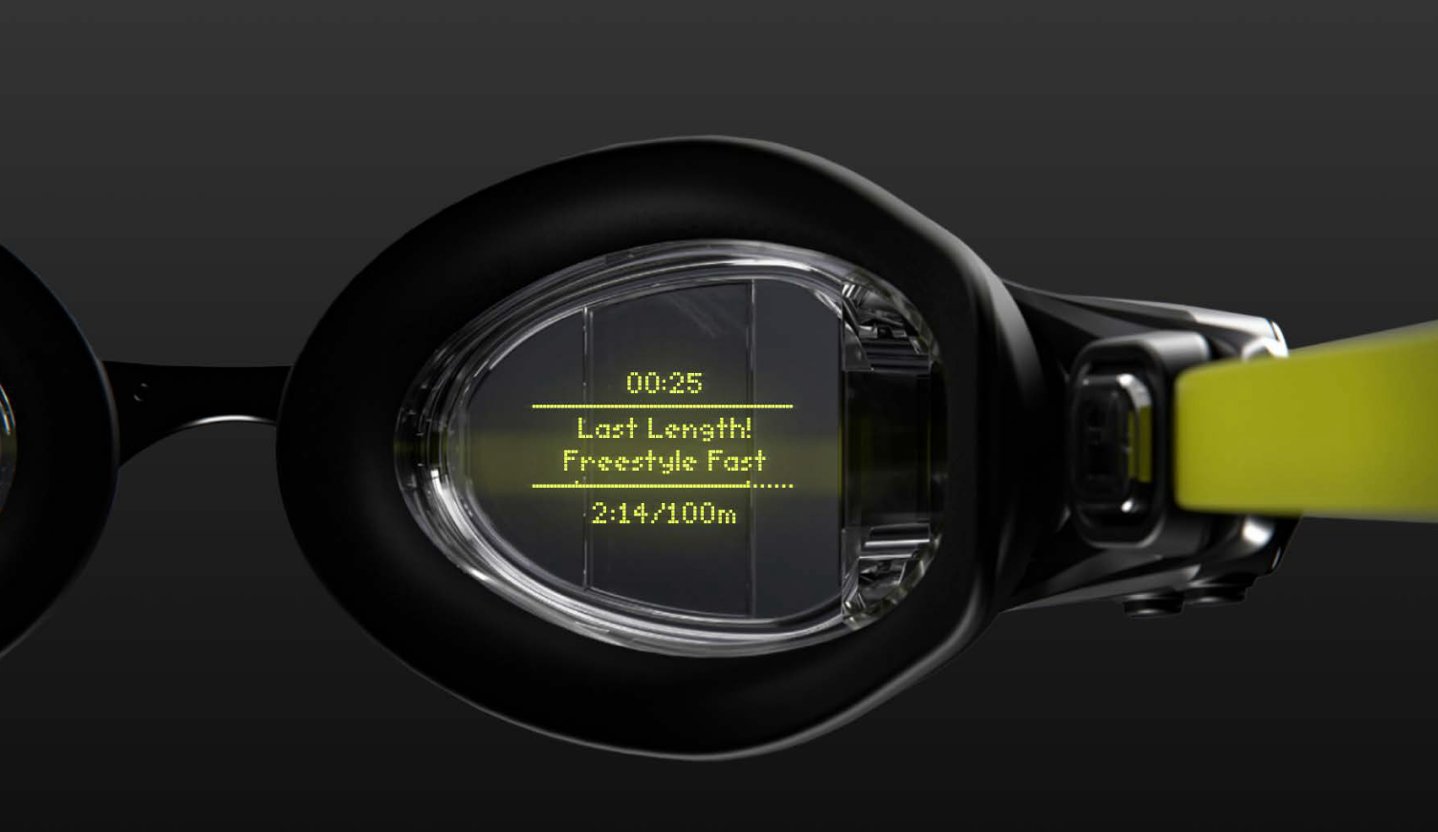
Again, it works exceptionally well. You just forget about ever looking at a watch, or a soaking wet workout sheet at the end of your lane, or your phone with wet fingers. You simply swim.
The last area to mention is the HeadCoach workouts that came out last fall. This is essentially a technique-focused game that you play, akin to Pong, inside the goggles, focused on keeping your head position within certain parameters. It’s very addicting, to the point it’s literally the only thing you concentrate on. It’s what swim coaches wish they could do in real-time with athletes in the pool, because your only focus here is keeping a ball between two lines. Simplicity in gamification.
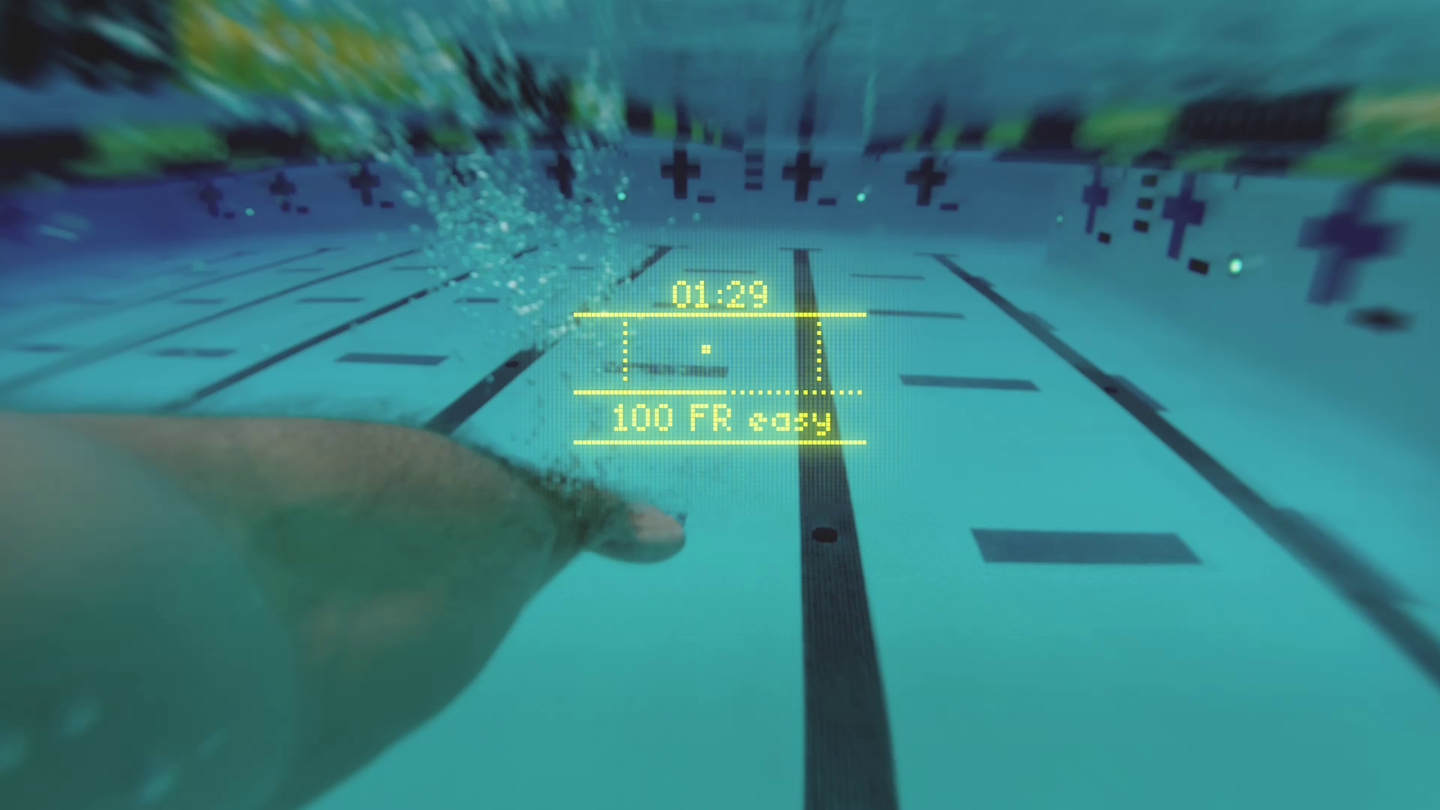
I wrote more about this feature and using it this past fall, so again, check out that post here.
Overall though, if you can get behind $99/year for access to all the structured workout pieces, there’s a ton of value here. Especially if you don’t already have an existing training plan or structured workouts. Inversely, if you do already have those pieces, it’s frustrating not to be able to access your own custom workouts without paying yet another subscription fee.
Openwater Swimming:
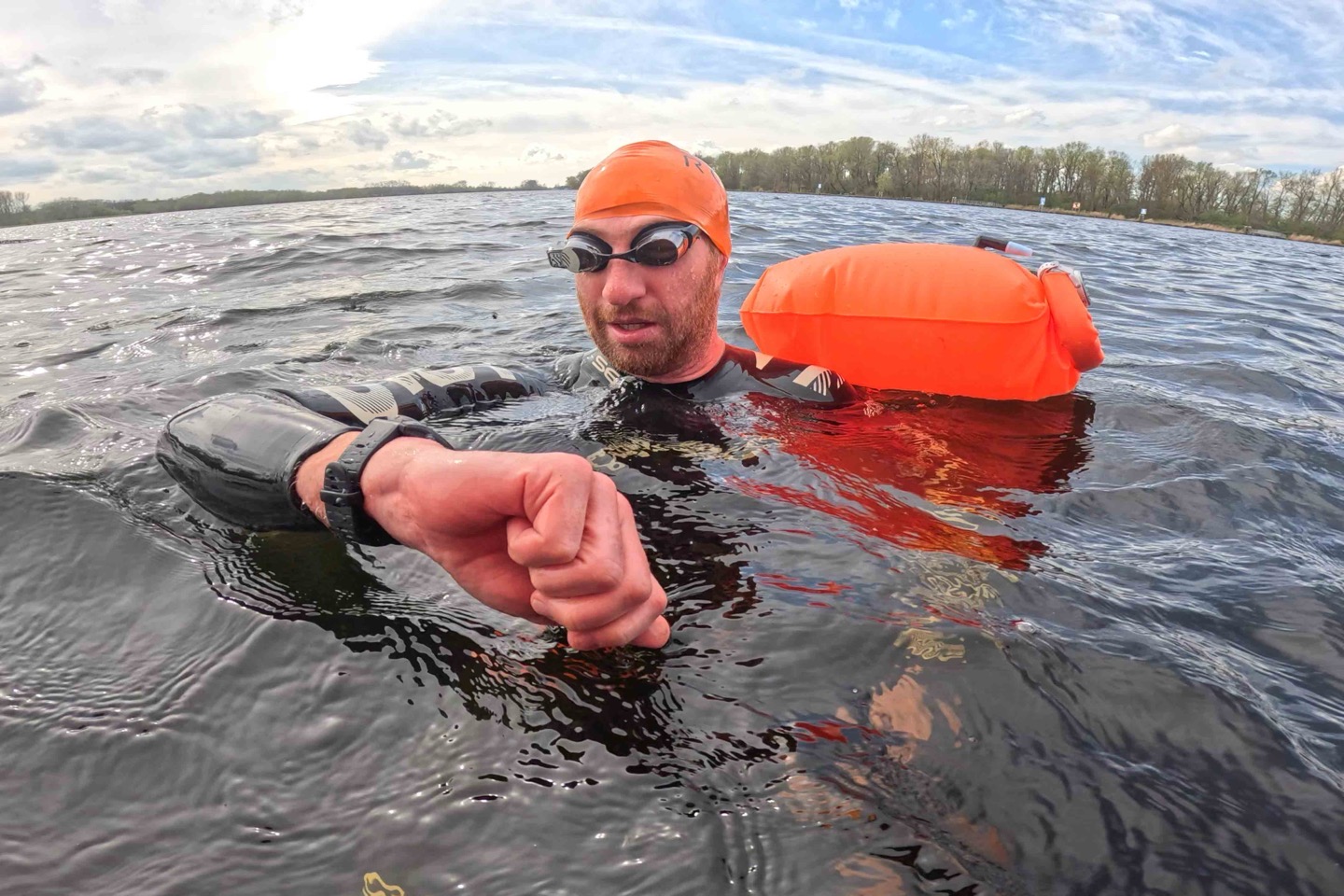
When it comes to openwater swimming, the FORM goggles have a few different modes – including one notably new feature, aimed at keeping your…well….aim. However, it should be noted upfront that these goggles don’t have GPS in them. Thus, by themselves, they won’t create an openwater swim GPS track, rather they depend on either a Garmin Watch or Apple Watch to gather distance/location/pace data. Still, the new SwimStraight feature doesn’t require GPS at all – so that will continue to work without any extra watch.
Thus, let’s talk about those two core modes:
A) FORM Goggles only: In this mode, you can use the new SwimStraight feature (if you have a subscription) to help you sight
B) With 3rd party watches: If you’ve got a Garmin watch or Apple Watch, then you can connect to those watches, and it’ll leverage the GPS data from those watches to provide pace and distance data. Afterwards, it’ll merge your activity files together, providing a seamless view from the two devices.
When you start off on an openwater swim, you’re presented with these two options. I’ve done both FORM-only, as well as Garmin-assisted. From a sighting standpoint, both work exactly the same way. Which gets us to that new feature: SwimStraight.
This feature is not complex: It’s just a compass. Still, it’s executed very well – and that’s the piece that might be overlooked. Keep in mind, each time you breathe, you turn your head – so FORM’s implementation of a compass can’t be dorked up every 1-2 seconds by your breathing, it needs to be steady and consistent.
To start though, you’ll do a calibration procedure. This takes about 10-20 seconds, and is done before every swim. It’ll walk you through this, but essentially you tilt your head down, then to the right (like touching your ear to your shoulder), then repeat for the left side, then turn 360°. And done.
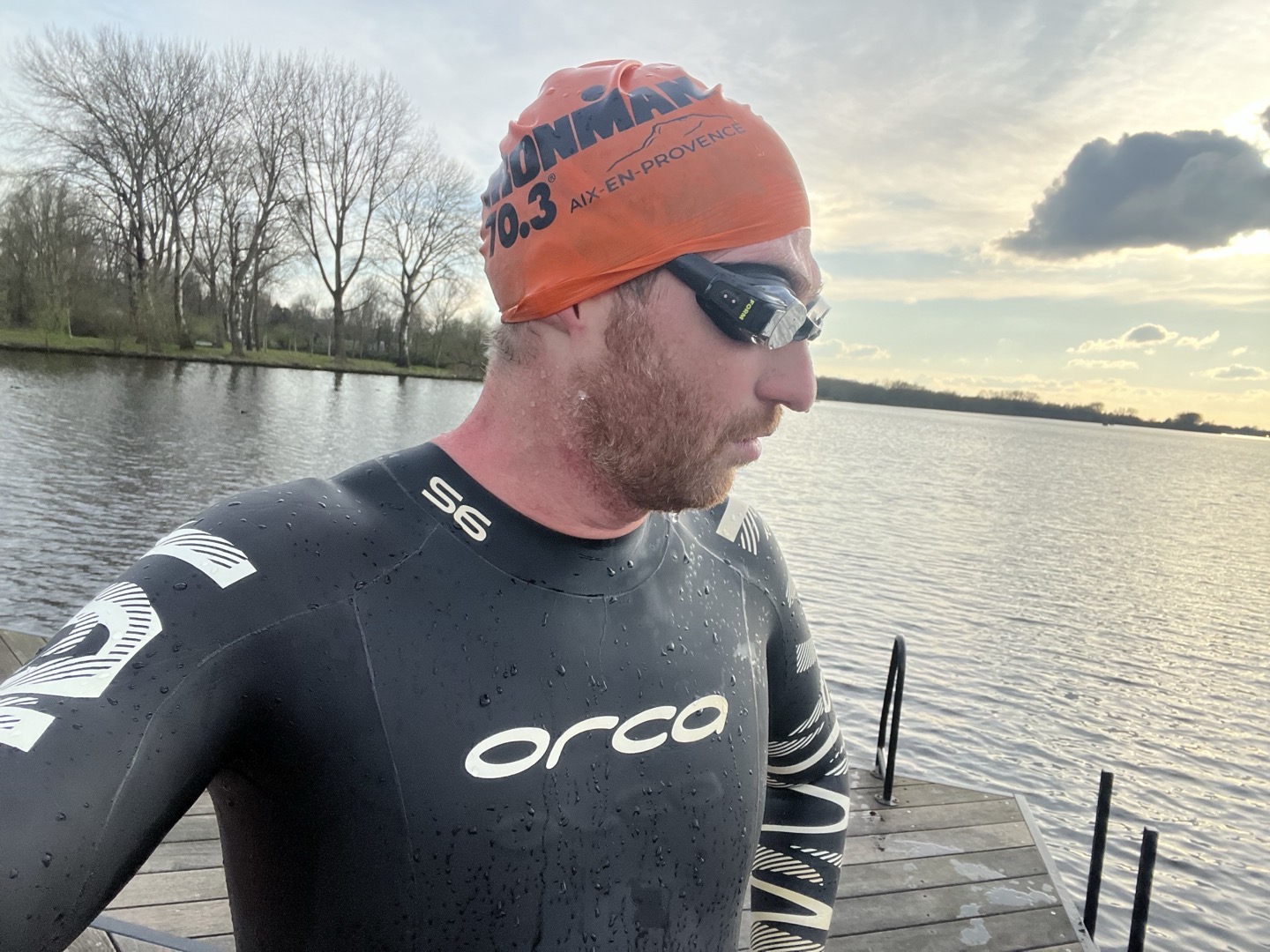
Once that’s done, off you go. Assuming you’re not using a connected watch, then you’ll start swimming and sighting. Within a few seconds you’ll see the compass appear in the goggles along the upper edge, showing your current compass heading. It’s up to you to sight off something (e.g., a building, buoy, mirage, lighthouse), and then roughly remember that heading. Once that’s done, you’re simply keeping that heading. It’s really that simple.
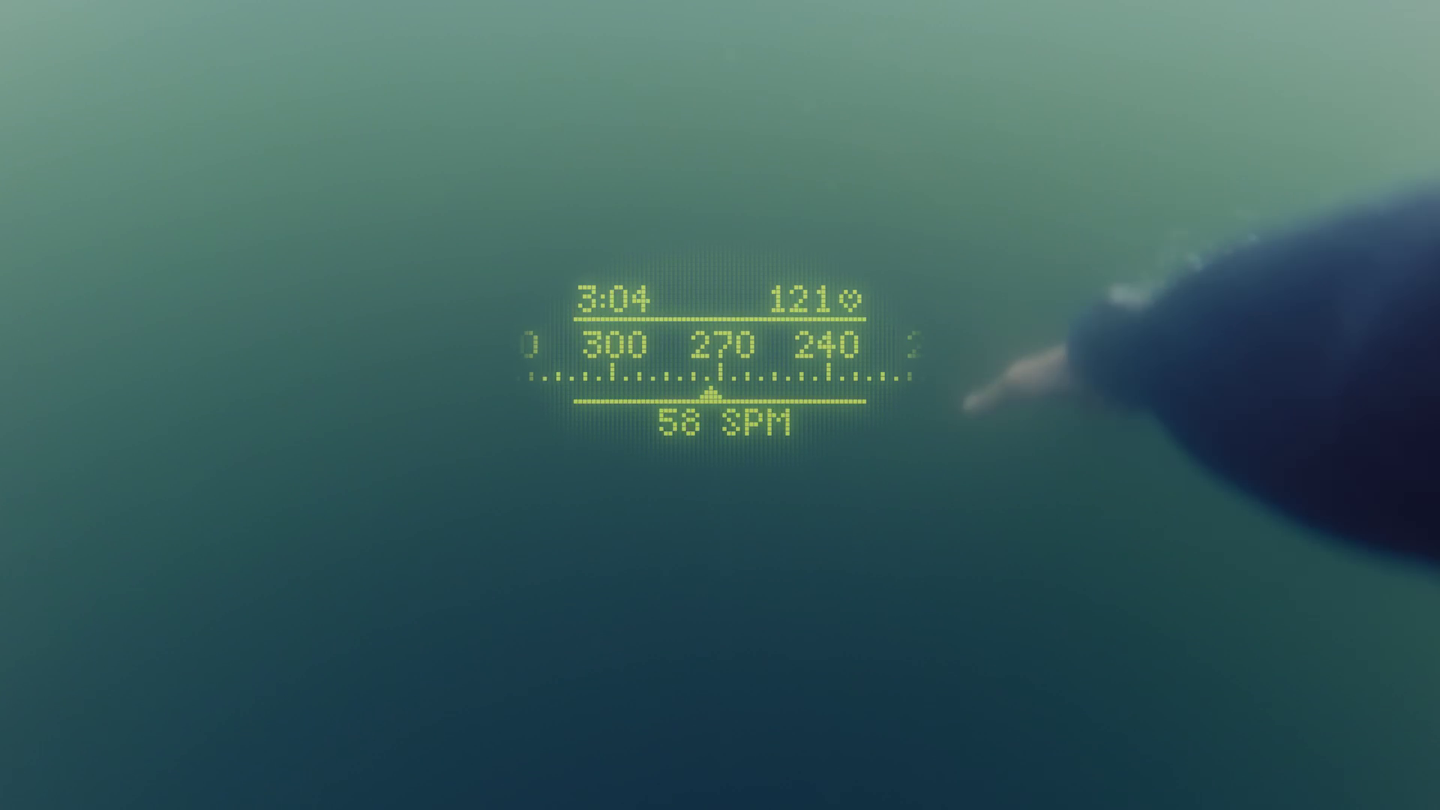
FORM says you should still be sighting though, and in fact, it’ll remind you every 20 seconds if it detects you haven’t sighted. It’s sorta like how a car reminds you if you’ve taken your hands off the wheel too long.
Now depending on how good at sighting you already are, you may or may not find benefits here. FORM included a bunch of before/after examples in their press kit, showing drunk-uncle swimmers that were cured of their inability to swim straight naturally. And, I don’t doubt it. Especially if you’re just getting into openwater swimming, it can be very hard to swim straight for long periods of time. This makes that super easy.
However, even for myself, I can see value here. As anyone who follows me on Strava knows, after 17 or so years of openwater swimming, I’m lucky in that I can swim really darn straight very easily, even for long stretches. However, where this is super useful though is for rough sea conditions, or bad weather, when sighting becomes more challenging (a lot more challenging). This is incredibly useful for that.
So much so that FORM has managed to get certification and buy-off from the following organizations *allowing* usage of the SwimStraight feature during races. As of today, April 2nd, 2024, this includes the following organizations:
World Triathlon (e.g. Ironman races), USA Triathlon, the Professional Triathletes Organization (PTO), and Supertri
Frankly, that’s super cool – especially for longer-distance swimmers, or even iron-distance swimmers on race days with rough weather.
Now, the next piece is what happens when you’ve got a compatible watch (Garmin or Apple) that you can pair up to it. Doing the pairing process is relatively straightforward. In my case, I paired it up with a Garmin Epix Pro watch, but it supports the vast majority of Garmin watches. FORM is leveraging Garmin’s app platform – Connect IQ – and a data field, which sends the data from the watch to the goggles. You’ll start the one-time pairing process via the FORM app.
Once that’s paired up, then when you choose to start an openwater swim, you’ll select to do so with a connected watch. From there, you’ll open up the Openwater profile on your watch, and then when you’re ready you’ll start the swim from your watch. Yup, starting the swim on the watch controls the goggles – a nice touch.
Now, you’ll still get the SwimStraight compass bits like above, but you’ll also see distance and pace information, which is coming from your watch instead. Further, by default with the V2 goggles you’ll get optical HR from the goggles, however, they’ll also pull it in from your watch. And interestingly, the data it leverages in the final file is the watch-given data, not the FORM data (not sure how I feel about that…).
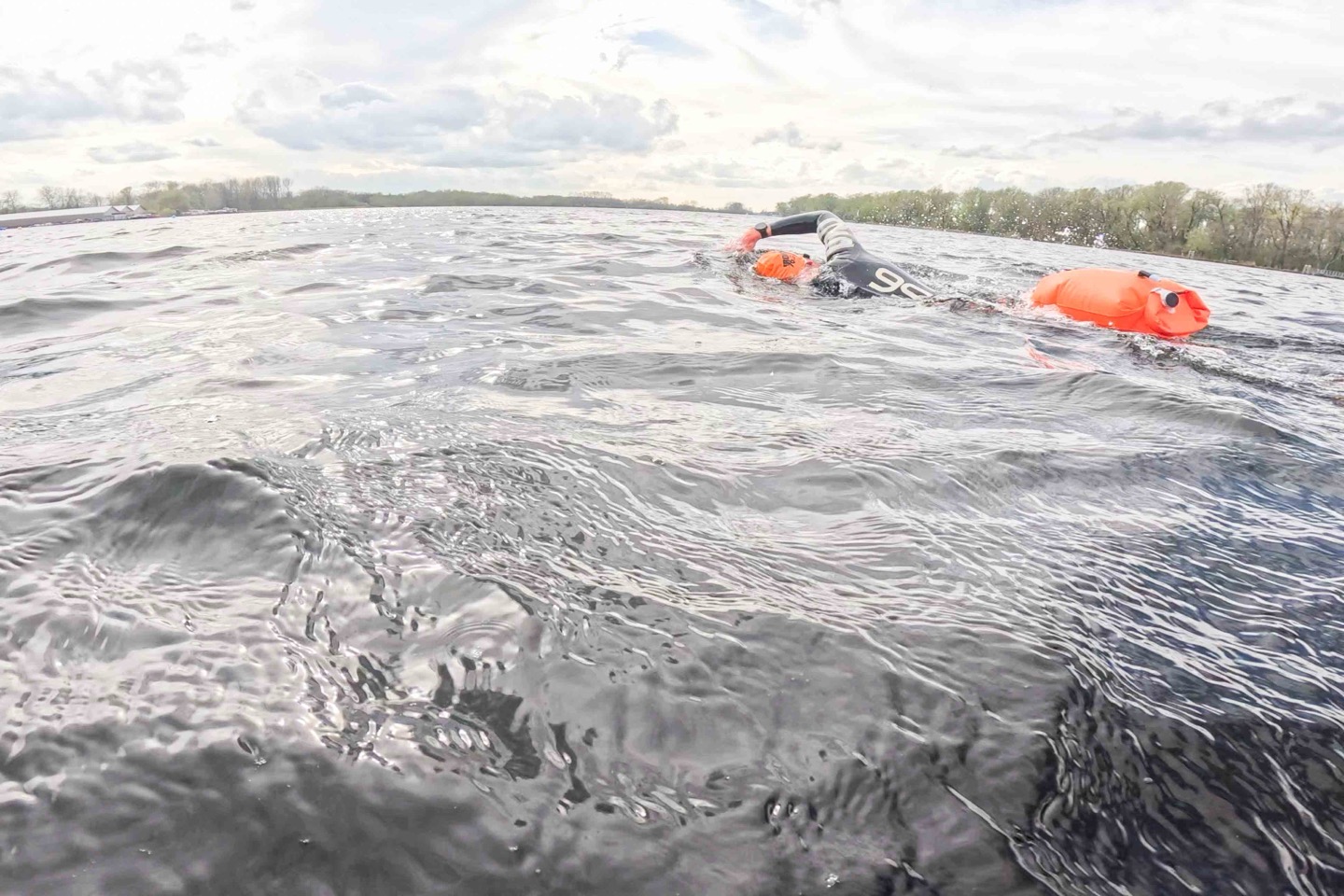
FORM does note that you should wear your watch on the same side as your FORM swim goggle pod (which, you can always change sides via the app). The reason being that connectivity between the watch and goggles only works above water, so it’s really only got about 1 second every other second, before it’s back underwater again. Having it as close as possible improves that connectivity.
During my swims, it’d occasionally disconnect, especially if I was treading water for a second, but then as soon as it had some clean strokes, it was good again and reconnected and simply caught-up to the watch data.
After your swim, it’ll merge the two files together (watch+goggles) to create one cohesive swim that shows up in your FORM account:
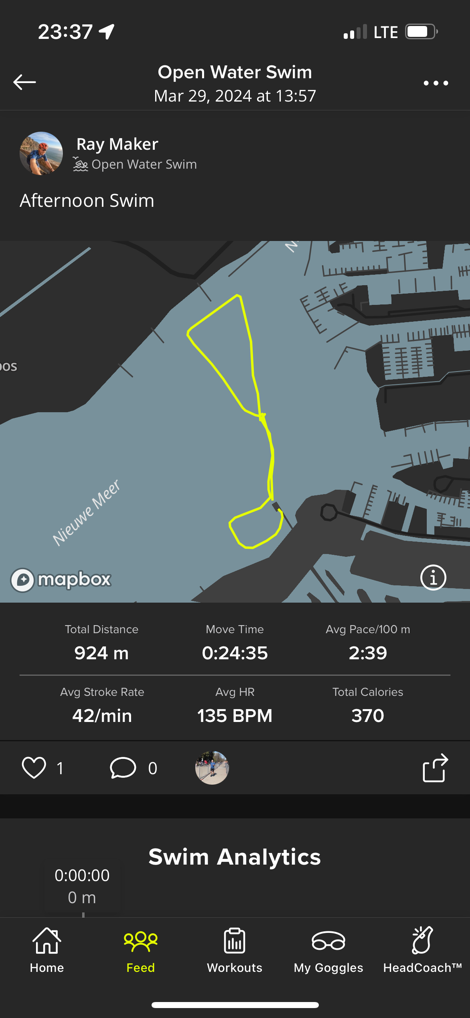
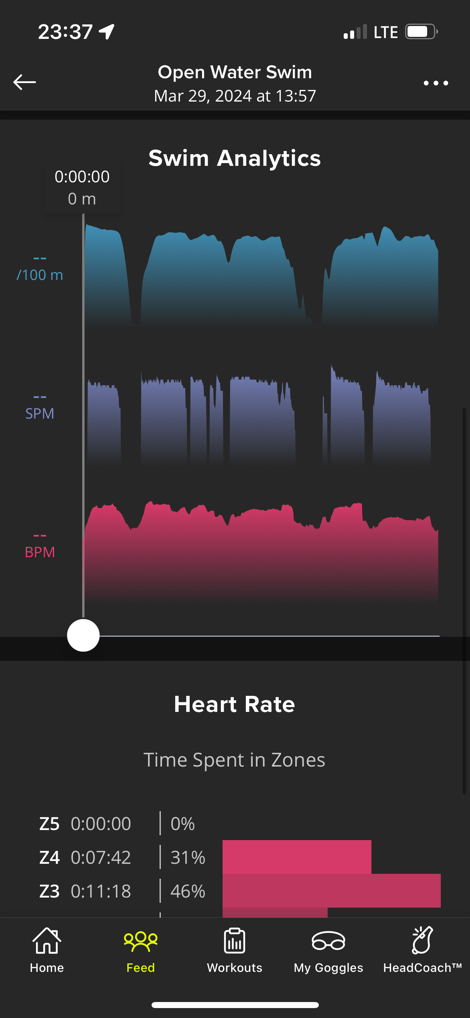
About the only minor disappointment here is that you can’t change the map type to any other map view styles (e.g. satellite/etc…), but obviously, if you’ve recorded this on your watch, then you can easily do that on the Apple or Garmin apps.
Overall though, the new SwimStraight pieces worked well, and the integration with my Garmin watch worked well too. I’m glad to see that existing FORM V1 goggles will also get the SwimStraight component via firmware update. The only downside here though, is that I feel for the price, V2 goggle owners should get SwimStraight without a subscription. That’s firmly in the camp of a watch feature, not an ongoing maintenance platform feature. I’m cool with V1 owners requiring a subscription, since that’s a substantial new thing for them – but I don’t think this feature should otherwise require a subscription on V2.
Heart Rate Accuracy:
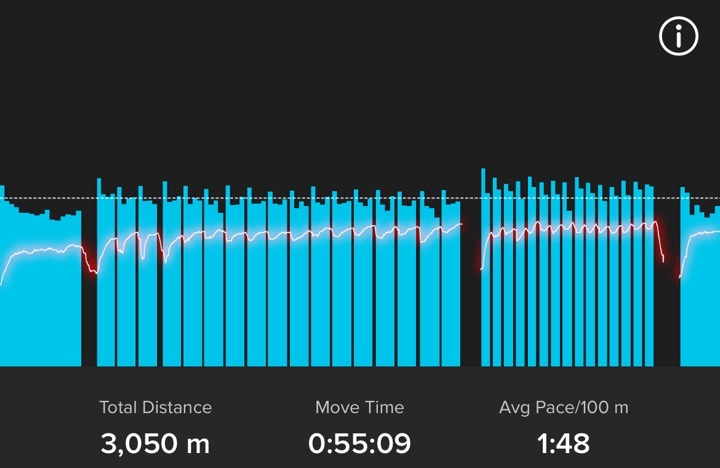
FORM says they’ve spent a lot of time on the accuracy of the optical HR sensor, and even put together some white papers around it too. As always though, I try and validate those claims as best I can. In the case of swimming though, that can be tricky. The reason is ironically the exact same reason FORM added an optical HR sensor to their goggles: Getting good HR readings underwater is messy.
From a traditional optical HR sensor in a watch standpoint, it’s very hit or miss – often highly dependent on the person and their wrists. Meanwhile, chest straps are equally finicky in the water. Non-swimming chest straps will usually get pushed down quickly on fast flip/open turns at the end of each length. After just a turn or two, they’re often around my waist due to the pressure of the water on the push. For women, this isn’t as challenging, because a one-piece suit will block that water flow. Some companies have made swim-specific straps, like Garmin’s HRM-PRO series, but that’s better in openwater or under a wetsuit. For pool swims, you really need the very old HRM-SWIM strap instead.
In any case, what I found pretty quickly was that I actually didn’t need to mess around with straps that much to validate it. It turns out to be pretty easy to see how spot-on it was. Again, assuming you sort out the connectivity aspects I mentioned earlier in the review. But that doesn’t impact accuracy, it was either showing HR or not. There was no in-between.
Check out this relatively easy set, in the sense of easy for an optical HR sensor. Here I’ve got the FORM V2, the Garmin Epix Pro, and the Polar Grit X2 Pro. You can see at the beginning, everyone is all over the place. I have no idea how to declare a winner there, as I think they’re probably all losers in different ways.
However, once we get past that, things look pretty close between them, especially for those 500m chunks that you see in the middle.
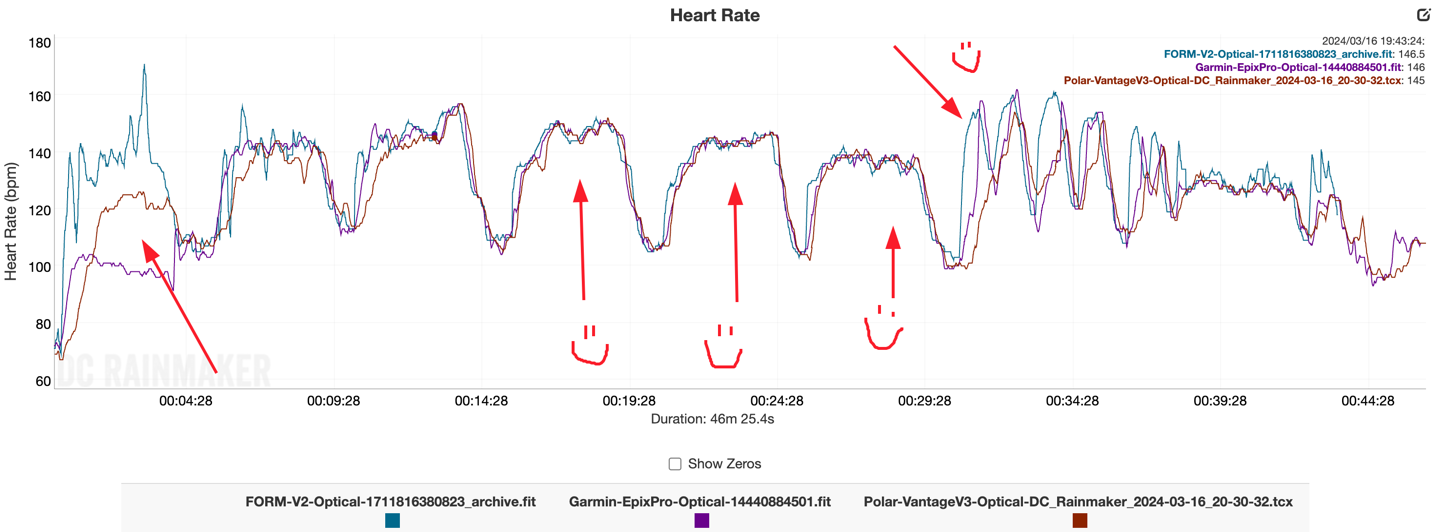
However, look carefully at those shorter intervals below the last smiley face. The Polar loses the plot entirely, but the Garmin and FORM units are pretty close. However, FORM is actually more accurate here – you can see it responding quicker at the start of each interval, where Garmin is lagging.
Here’s another example, again, notice on the shorter intervals at the end how the Garmin lags (and Polar is still lost), while the FORM is clearly tracking intensity levels very quickly. Note in this set the Polar Grit X2 Pro is running near final beta software, however that may change by release to improve accuracy. The previous set was a Vantage V3 on production firmware.
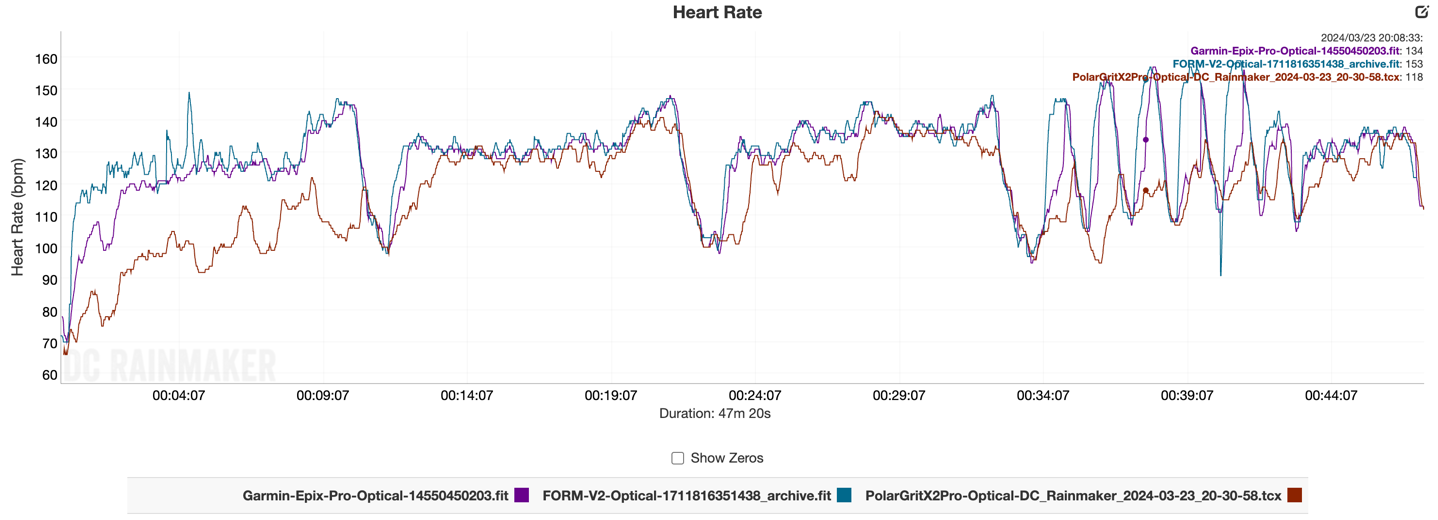
Then we have another swim, this time with a slate of shorter intervals, and you can see it far more clearly. While the Garmin does match FORM on some of them, most of the time it’s latent (and again, the Polar far more latent on this beta firmware). One can see how, in this scenario, the watches are undercutting the total intensity of the workout, because it doesn’t capture the full duration of the time spent at higher heart rates.
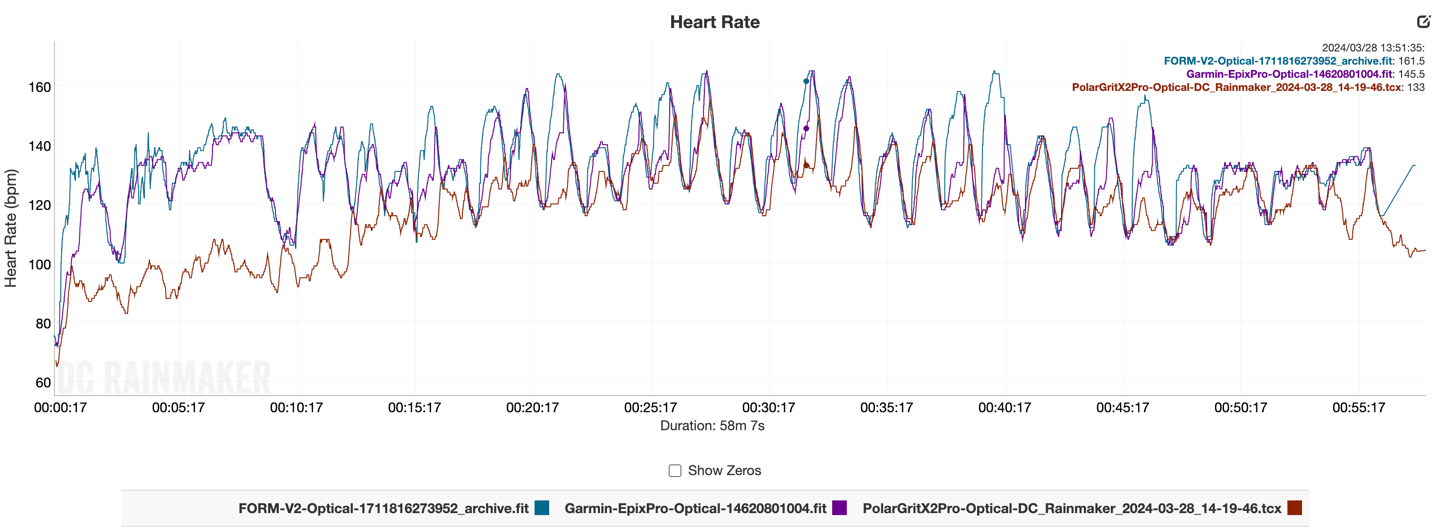
Ultimately, I’m seeing pretty good accuracy here, or at least it appears considerably more accurate than their units. I’d still like to dig out my older HRM-SWIM strap and do some tests there, and maybe convince my wife to do some more chest strap tests (she’s not a fan of chest straps) since the strap won’t as easily slide for her. Nonetheless, at this point FORM has clearly established a higher level of responsiveness and heart rate accuracy than their key competitors.
Wrap-Up:
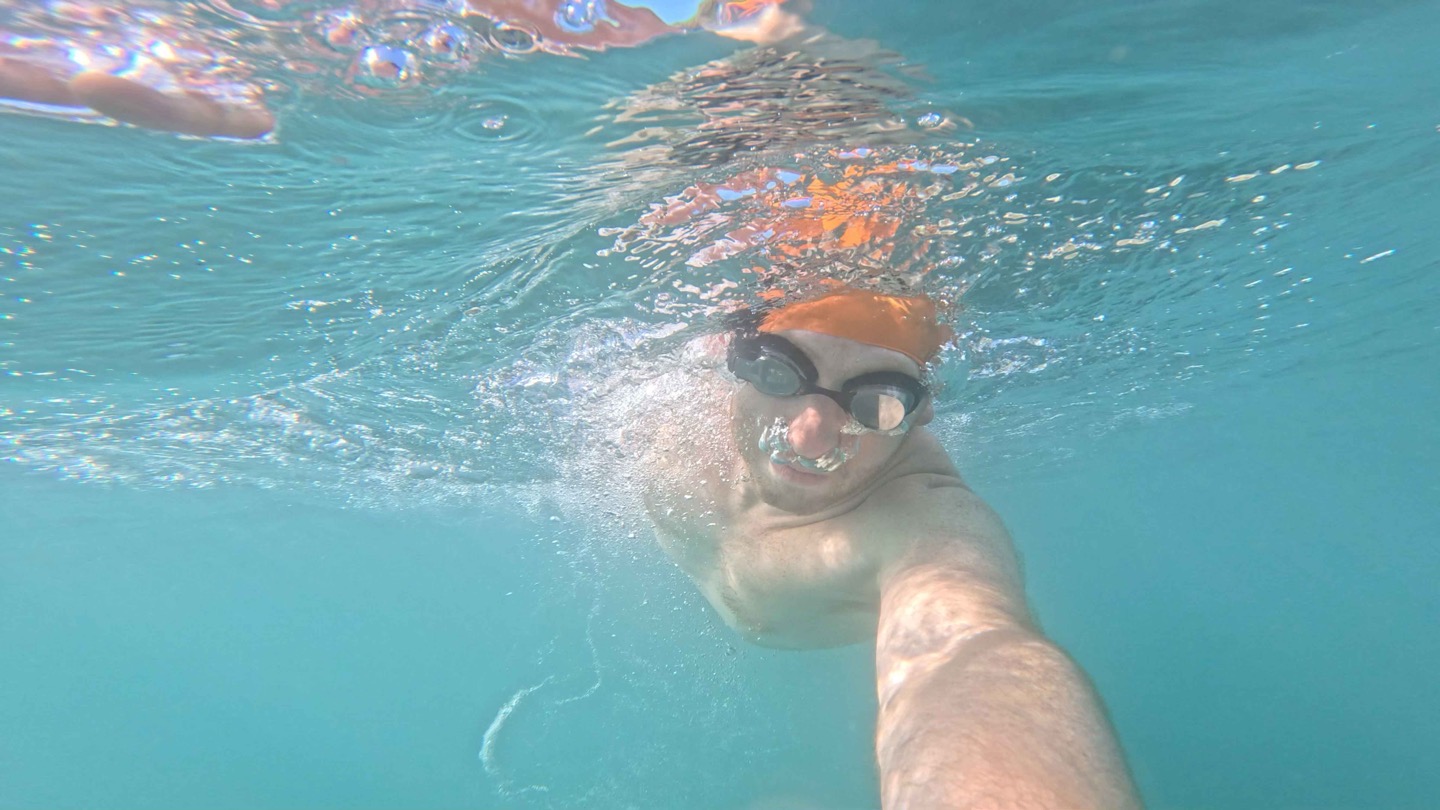
Sometimes minimal upgrades are the best upgrades. In the case of the Swim 2 goggles, whether or not it’s a minimal upgrade really depends entirely on whether or not you care about heart rate tracking while swimming. If you do, then this is probably seen as a pretty compelling upgrade. FORM has previously integrated with Polar’s Verity Sense optical HR sensor to clip on the goggles, but this is clearly a much easier solution that doesn’t require charging two things (and is a wash in terms of price, if you were only using it for swimming). Inversely, if you didn’t care about heart rate during swimming, then there’s not much to see here on the V2 hardware.
However, regardless of which goggle you have, the inclusion of SwimStraight for openwater swimmers is pretty slick. Especially given it’s being made available to V1 goggle owners as well. Albeit, as noted above, I feel like this should be included without requiring a subscription for V2 goggle owners.
A lot has been made about FORM’s subscription component. As I noted earlier on, they’ve tried numerous business models. But as I also noted last fall, FORM’s provided subscription numbers here certainly validate that there’s enough interest from people within this business model. Whether or not they could get more hardware purchasers with a tweaked business model is of course up for (still endless) debate. Obviously, many companies are shifting towards recurring revenue as a more stable means of doing business – especially to support longer updates on the software front.
Setting aside those features, even if you just use the base goggles for tracking your swims, it’s astonishingly good at doing exactly that. And honestly, it has been for years. There’s very few FORM users who would argue with that component of it, this simply improves upon that by bringing in heart rate tracking that seems quite accurate once you’ve got it fitted properly.
With that – thanks for reading!
Found This Post Useful? Support The Site!
Hopefully you found this review/post useful. At the end of the day, I’m an athlete just like you looking for the most detail possible on a new purchase – so my review is written from the standpoint of how I used the device. The reviews generally take a lot of hours to put together, so it’s a fair bit of work (and labor of love). As you probably noticed by looking below, I also take time to answer all the questions posted in the comments – and there’s quite a bit of detail in there as well.
If you're shopping for the FORM Smart Swim 2 Goggles or any other accessory items, please consider using the affiliate links below! As an Amazon Associate I earn from qualifying purchases. It doesn’t cost you anything extra, but your purchases help support this website a lot.
And of course – you can always sign-up to be a DCR Supporter! That gets you an ad-free DCR, access to the DCR Shed Talkin' video series packed with behind the scenes tidbits...and it also makes you awesome. And being awesome is what it’s all about!
Thanks for reading! And as always, feel free to post comments or questions in the comments section below, I’ll be happy to try and answer them as quickly as possible. And lastly, if you felt this review was useful – I always appreciate feedback in the comments below. Thanks!


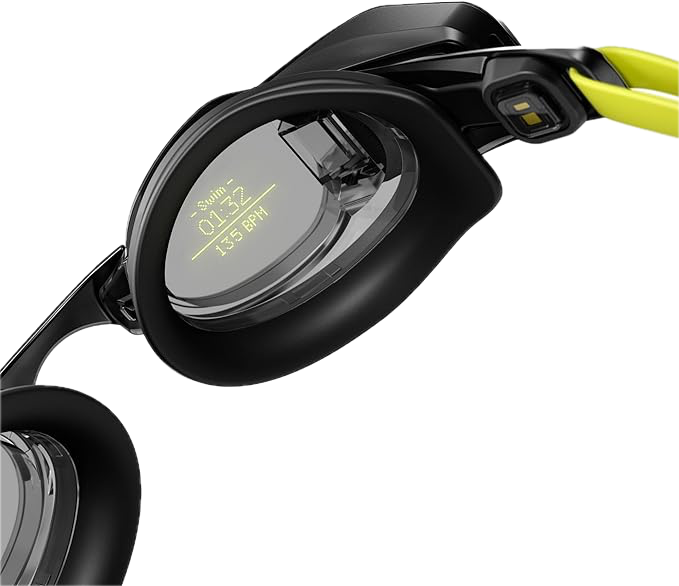

















How are the new eye cups, do they feel more comfortable than the previous ones? That’s probably my biggest complaint about the V1 gogles, I could never figure out a fit that doesn’t leak except by putting them on uncomfortably tight.
I was lucky enough to be a beta tester for the new goggles and have been using them for 6+ months (no affiliation with Form other than beta testing as I’m in Vancouver where their office is) and the new eye cups are exponentially more comfortable than the old ones. The original Form V1, I could swim about 35-40 mins before my face/head just started to hurt. The news ones are way softer, way less leakage, and no problem lasting 75-90 minutes without any face pain (although they still leave some good racoon eyes, just without the ouch factor).
Just one man’s experience, so take it for what its worth but that’s probably the one thing Ray’s review doesn’t talk about enough was how uncomfortable the originals were, and how much better the v2 eye gaskets are.
Thanks for the review of the eye cups. I agree with you, the first generation is painful after an hour of swimming. Since FORM did not change their lens design, the second gernation eye cups will fit on the firt generation goggles. I have ordered a set of the new eye cups from the FORM store.
the tool to help with sighting is neat.
I had the Form goggles but one day it said it needed a subscription to work. I guess the trial period had expired. I placed the goggles in its case next to the pool and by the time I got home they got lost….not sure if they were stolen or I misplaced them but I blame it on the goggles refusing to work just before my workout. I believe when I bought them they still had the option to be used without a subscription but whatever. I have since switched to Holoswim. Theirs is more streamlined and doesn’t require any monthly plans. I tried them in open water but the day was too bright and I could not read anything. Not sure if these displays are visible outdoors. Indoors both were ok. Instead of coaching, maybe Form ought to also offer a subscription for new cups or higher upfront price. A visual metronome would be a great tool too.
Wow, thanks for braving the cold for this review!
Is there any solution to getting FORM workouts from the pool into Garmin? Seems like the only option is dual recording and hoping the Garmin figures out what’s happening, but no way to actually import from FORM to Garmin effectively?
I couldn’t figure it out either so in the end only recorded pool swims on the goggles which auto uploaded to Strava and then exported original FIT file from Strava and manually uploaded to Garmin Connect. Not ideal. But felt that would add life to the watch by not using it in the pool at all.
There’s an “export swim data” option in the Form app that emails you a FIT file of your workout, which you can then upload to the Garmin Connect website. There’s no way to send your workouts from Form to Garmin Connect automatically.
I’ve chided Form on this in the feedback surveys they send out regularly. They say the issue is on Garmin’s side of things. I just dual record and delete one record from my Training Peaks. They correspond pretty well to be fair
Ray, my main concern is that with all Google’s I buy, after a bit two things degrade:
1. The lenses start to fog up quickly and nothing seems to prevent that
2. The rubber seal becomes warped or cracked
How will Form make this expensive device workable for years?
the eye seals, straps, nose bridge and non-display lens are all replaceable. I’ve had v1 since 2019 and the fogging in controlled fairly easily. I use an anti-fog or just clean them with mild dish detergent every so often. No issues.
Thanks Ray
Are the combinations of data fields and the screen itself the same between v1 and v2? Can v2 display more or different data?
Sorry, second question.
Can you confirm that you can see the Goggle based HR data on openwater swims. This was a limitation on v1 where it would only show connected watch HR and not HR from the polar sensor.
Form website for v2 still says “Open Water: You can also see a real-time heart rate when connected to a compatible Apple or Garmin Watch.” which suggests it wouldn’t display headstrap HR data.
On the first picture, showing swimming with swim straight without connection, it is showing the heart rate.
Even not Ray’s experience here’s an excerpt from Forms help article:
Open water with a connected smartwatch
[…]
With Smart Swim 2, the goggles use the integrated heart rate sensor.
link to support.formswim.com
Ray, you didn’t mention the integration with the polar OHR sensor on the original form goggles.
I use that and it works well, so that’s an option for people with the v1 goggles already.
Obviously for new purchases it’d be cheaper to get the integrated OHR with the v2 if you don’t need the sensor for anything else.
Thought it worth mentioning here in case anyone didn’t know about it.
I had mentioned it in the closing section. :)
They lost me when they started their unreasonable subscription strategy.
Subscription Req for:
#1 Training Peaks update
#2 Personal training plan
I have too many subscriptions as is so I’m not interested in going anymore subscriptions. I have the original Form goggles. Stopped using them since they started locking up the two features above. Those two features are available on every single gadget that I use and don’t require subscription. Convenience vs $$ just isn’t for me.
Just like Garmin, Apple, etc… can rely on me upgrading my gadgets, Form “could have” relied on me upgrading my goggles every upgrade. The unreasonable arm twisting for getting the subscription just taste foul. ugh.
I’m sure there are lots of athletes willing to fork out another $100/year subscription. I’m just not one of them. All good. Lots of cheaper options with better fit and visibility without the electronics besides, I always use my Garmin and Apple watch when swimming anyways.
Are there limits to the pool length? I swim half the year in my backyard pool which is only 40′ or 13.33 yards. With Garmin the minimum pool size is 15 yards which is a real bummer.
Thanks
Jon
You can set custom pool lenght any size
Found the answer to my question here is what I found for anyone interested.
According to their website
Please note that the minimum pool length is 15 meters or 16.5 yards
See below response from FORM
I’m sorry, a 40ft pool is too small for pool mode with our goggles. You would be able to use swim spa mode with limited features. I will share your feedback with the team, though, for future consideration!
I can see the utility of the compass in calm and current-free water (or a current that is parallel to your intended direction), so many of the lakes I’ve swam in would work. In the presence of such a current (e.g., rivers, ocean) it seems to me that the resulting drift will cause a constant conflict between the heading I actually need to swim to get to a fixed landmark and the heading I derived from the last sighting 30 seconds ago. If I have to sight every few strokes to correct for drift, then the utility is diminished.
But there is nothing a pure compass (i.e., without GPS) can do to correct that.– and this is basically why they want you to re-align every 20 strokes. With a constant current, you can correct by setting a “higher” course to compensate, but that depends on the distance to your target.
Yeah, not paying a subscription for base functionality such as importing my own workouts.
I wasn’t going to do it when they included 12 months subscription free and I’m definitely not going to do so now it’s only 2 months free.
Man, that sneak peak of the new Polar Grit watch HR sure is sad. I was looking forward to it being better than my Epix in at least 1 way, but I guess not (at this point).
To be fair, it was technically non-final firmware now given the delay of the watch by a few weeks.
I am near sighted and find the Form display difficult to read (in proportion to my degree of nearsightedness -3.5 diopters). Form indicates that they do not have plans to address.
Hm, I am at -6, I guess I should not buy it…
Too bad, the devil takes the hindmost.
On Saturday I was looking at Form Swim goggles, at this time there was a 12-month premium membership included if I’m not mistaken. Now even old Smart Swim 1 comes with 2-month premium only :-(
I should have ordered it as there is a 30-day return option…
First of all, am I just overlooking it, or did you manage to not include the price? I mean, the hardware, not the subscription (you made sure to state twice that your wife is pretty arn happy, which is more imporant, i guess ;-) ).
I am also team “no subscription”. I would like to try those, especially the swim straight feature… but not if it comes with a 100$/year price tag. As you said, this is clearly a product feature and not a subscription feature.
Why didn’t you swim with the HRM-pro wearing your trisuit? I get it, it’s not like most people swim, but you could do it for “us” and for the sake of a good review. I do agree, it looks like the HR results from the google are good, but with a strap, there would be “prove”.
Wow, a compass for openwater swim mode is a great feature. So similar to heading indicator in small planes/boats, you just choose the next point to navigate and keep an eye on the this heading from time to time. But subscription for this, really? I totally agree with you here, it is a hardware feature and should be coming included without subscription. I understand subscription model for the workouts and coaching, but not for this.
It sound like paying monthly for using gps features on any Garmin Fenix/Forerunner watch i.e. ridiculous.
That’s too bad it’s only compatible with Garmin / Apple watches ! Any plans to extend the compatibility with other watches ?
Android Wear devices aren’t that common yet, hence no support. And other manufacturers simply don’t have any app development framework like Apple or Garmin.
Suunto has capabilities to develop integration, it’s up to Form to use it
What is a price of V2 goggles?
249 €
link to eu.formswim.com
Hi Ray,
Thanks for the review and for suffering in the cold water for us to read it!
This is definitely an off-topic, but I’ll still ask – is there any chance you would review ENGO (a similar HUD but for dry-land sports)?
And they still don’t, as far as I can tell, have lenses for those who need vision correction. That’s a deal breaker. If I’m spending $AU300 on a pair of goggles, I need them to have corrective lenses so that I can sight. No corrective lenses means I can’t sight means I might as well give up before I even start.
Yes, the DISPLAY is visible for those with up to a -3 prescription (I’m -2.5), but that’s not what I’m concerned about here. And yes, that’s less of a concern when I’m doing laps in the pool – but why spend $300 for a training toy that you can’t use on race day, despite it being race legal?
I’d be likely to start saving my pennies for these if it weren’t for that deficiency. And no, I’m not wearing contact lenses underneath the goggles. That strikes me as being a recipe for disaster if I’m doing an ocean swim and the goggles leak for whatever reason.
Just my 2 cents: I am at -5.5 / -6.5 (left / right) and I am doing open water swims and triathlons without corrective lenses. The main issues is finding my way through T1… but that’s either solved by Ironman (by providing a “glasses table” at the swim outlet or by me doing good enough “course checking” through transition before the race.
And if that works for you, I’m happy for you. Seriously and genuinely.
The problem I have is that my sighting isn’t that great to start, and I’m not a super strong swimmer (typical half Ironman swim, around 50 minutes; the one and only full Ironman swim I’ve done, I took a little over 1:40). I _need_ to have decent distant vision to get through the swim without freaking out with fear that I’ve gone off course (yes, there are lifeguards on paddle boards who would correct me, but it’s a stress that I really don’t need on the swim leg.)
If I can’t get corrective lenses in a given set of goggles, I’m not interested. That’s what it comes down to for me. Maybe Form have decided that the marginal gains by doing that isn’t worth it to them, and that’s a legitimate business decision. But if they can’t, or won’t, supply a corrective lens option, I’m simply not going to buy the product. Not for the $AU300 they’re charging for it.
Another vote for the “I paid in full for the hardware up front, and it’s my personal data, stop trying to charge me endlessly in the greedy trendy newish-subscription cash grab”.
Trying to charge me more for full access to the hardware or unlocking gated code on the hardware, or to import or export my data into or out of your platform is BS, and outright illegal in some regions. With net neutrality coming back to the US end of April, I’m hoping legislation starts to pass against this practice shortly after. And then when that mis-managed business blows up in the company’s face and they announce a shut down as with Sapiens, their paid in full consumers are stuck holding expensive useless hardware. So much for brand loyalty right?
Otherwise cool hardware and appreciate the writeup! And Ray I think you missed a “t” in mater vs matter above.
Fantastic review as always, and kudos to the FORM team for some really neat updates. As someone who was doing weekly ocean swims with big waves, the nav feature is very cool. And I’d love to not have to think about workout sets or look at my watch in the pool. And yet, I’m out. And I’m out for one simple reason: the subscription. Enough with the subscriptions. And doubly so in this case because charging a subscription to bidirectionally access what ultimately should be my own data is just wrong. In the grand scheme of what we spend on sports tech, this isn’t a big deal. Even though I can afford it, however, I’m personally setting a very high bar for new subscriptions, and am philosophically opposed to paying someone for the privilege of using my own data.
At the same time, I fully recognize that we’re living in a world in which bike and sports tech companies are folding at a remarkable rate. FORM will only survive if they can sufficiently monetize both the product and the service. Totally get it. And I happily pay more for subscription-free devices when they are available. But this one just doesn’t make my personal cut for justifying a subscription, especially when I’m going to be wearing my Garmin regardless, and I’m not going to give them money so I can use my own data. I’m sure others will disagree because it is cool stuff, and in a few years the market will tell us whether this monetization model was successful.
Hi guys! Going a bit off-topic but, what do you use for (and if) listening to music while swimming?
I need one with screen (for audio books) and only know about two (won’t name so you guys not consider it spam) but they both have a jack charging mechanism and it rusts out when using it for long.
Thanks as always Ray, those waters are cold indeed!
I would like to understand how well the swimstraight feature works with a course that includes multiple turns requiring change of direction. After you round the first bouy how do you lock in on the next bouy?
There is no ‘lock’ per se. Your brain is the lock. ;)
So basically, it’s just a compass that’s updating in realtime, but there’s some algorithm work to make it relatively stable despite your head bonking all over the place.
I would like to see a follow-up detailed review having more complete testing on SwimStraight. As you mentioned this feature requires subscription so it is costly. I would like some testing on different course shapes. It would also be helpful to have some comparisons on the same course where you perform tests with normal goggles vs Swim 2 to see how much actual reductions you get by using swim straight. Obviously the benefit will decrease with the swimmers level of experience but is there measurable value for middle of the pack experienced open water swimmers? Maybe you can write off the cost of travel to a warm destination as a business research expense?
Thanks. Yeah, I do have more warmer water openwater swims planned in a few weeks, and actually did one earlier this week as well.
That said, there will be no difference no matter how complex the course/route. Given it’s just a compass, it doesn’t have any knowledge of the route or complexity. Rather, it’s just you going from one buoy/marker to the next, rinse/repeat. Like I did with the Amsterdam swims, I made various triangles/etc, so I guess about a 5-point course in total, and once you’ve decided it’s the direction you’re going, it’s up to you to remember that heading.
I would like to see an HR comparison between FORM and Polar Verity Sense (or Polar OH+) and HRM SWIM (or HRM PRO under a wetsuit).
Can Polar Verity Sense be connected to FORM v.2?
I’m not aware of any changes there, but I’ll check when I get back.
I‘ve got a pool with a strong counter-current for training. I can‘t use „lane measurement“ and also not GPS to define my distance (but only the current and „math“ or general experience). Does the form track strokes „indefinitely“ or allow another form of tracking – like baselining the strokes in a normal pool and then calculating the distance on the fly. I guess not – but it would be nice as no other tool is doing that to my knowledge. Thanks!
I’ve used my V1 Form goggles for about 2.5 years for both pool swims and OWS. I like the structured workouts in the HUD and I’ve found the fit pretty comfortable on the whole, even for a 2.5h 8km lake swim last year. I find it frustrating that they still don’t have PRs in their software, like Garmin shows (I’ve asked repeatedly, but ‘no plans to implement’) and the dual recording with Garmin is a faff. I’ve no interest in their social media function at all, never will. But I keep paying my subscription nonetheless, it sits just on the right side of value for money as far as I’m concerned.
Both the current article as well as the purchase page on Amazon state that Form 2 comes with 2-month free trial of the premium subscription; however reading the previous DCR article on HeadCoach review (probably written at the time of first iteration of the goggles). It states: “… When you buy a FORM goggle, it comes with a 1-year subscription, after which it’s $15/month. Not the cheapest thing out there, but roughly in line with running/cycling training plans/coaching platforms.”
Could someone confirms if that’s the case? That coupled with the sighting feature requiring monthly payment; that’s a solid hard no from me.
Your understanding is correct. 2 months free currently. It was 12 months free at one point. Yes, FORM is again attempting to manipulate users into the subscription by disabling hardware features. Holoswim is a viable alternative if you don’t want the built in HR and compass. Less expensive than v1 and NO subscriptions. Plus, on sale at the moment.
That’s really good intel on the Holoswims, thank you.
Is it possible to get prescription/optical form 2 goggles with minus 3?
If it is nit possible to order optical ones, is there any solution for them who needs prescribtion one?
Ray is it true they are shipping with USB A?
How come, I thought EU law meant everything has to be USB C now?
The EU USB-C law doesn’t kick in till the end of 2024 (for new products from that date).
Hey Ray,
I just got one recently. Did you noticed the compass tape in the display is backwards? ie: the compass heading numbers should increase as one turns right, and decrease going left. But mine is backwards! Wondering if yours is the same?
Is this a bug or ‘feature’?
-Dean
Oh, their firmware update last week (July 8, 2024) fixed the reversed compass tape issue!
Bummer, the open water compass mode is what I need (can only freestyle with a snorkel due to a neck injury) and that requires a subscription! I guess the business model, and I’m only one potential buyer lost, but that’s a disappointment. Anyone found a good alternative?
Open water means lakes only or can can I use them in the ocean?
Another great article, thank you. The subscription fee to access the included hardware of straight swim is enough of an annoyance to have me looking for alternatives. Have you tried the OnCourse googles? link to oncoursegoggles.com
Forget all the metrics.
I need a direction finder in an open swim triathlon.
Can we get that?
To quote T. Bradshaw in the Canon Ball Run Movie, I can’t see $#!+ can you?
I just got V1 as they are now on good price (€129) and I took them for the first swim in the pool but it was awful experience – i almost couldn’t see anything. Side vision os very limited and i get that but for me also looking straight was very blurry and limited so i hardly could see the black line. It’s nowhere near to what Ray shows above on the picture how it should looks like. They also went very foggy.
After rising and drying i tried them outside of the pool and indeed the vision is quite blurry for me, with reflections from how the lens is shaped.
I dont have it in my Arena Cobras. Can I do anything about or FORMs are simply not for me?
I’m late to the party, so Ray may not see this, but I’m wondering if the old trick that Ray used to improve GPS reliability (putting the watch in his swim cap) would work for eliminating the left wrist / right eye problem? Wearing my Garmin on my right hand would drive me nuts!
Hello, Has anyone used or have experience with using these in a swim spa as far as obtaining distance. I use an Apple Watch and that does not seem to have the functionality or at least that I have found so far to capture it. All I can get through the watch is time and HR. Thanks!
I loved my FORM1 goggles and am now okay with the fit of the FORM2. When you have to wear tight swim caps, the pressure on the hr sensor lifts off the goggles sometimes, which leads to fogging/leaking. I hope the next iteration can make the HR sensor’s connection more flexible. They say FORM2 pro has not changed.
BUT, I noticed a more than 10% open water distance discrepancy in GPS length and pace between the native watchOS U2 recording and FORM+AppleWatch. For me, this is a recurring issue. Interestingly, FORM+Garmin looks okay.
My guess is that FORM APP postprocessing has an issue.
This changes my average open water pace at more than 10sec/100m.
Does anyone can confirm?